រាជបណ្ឌិត្យសភាកម្ពុជា
Royal Academy of Cambodia
Royal Academy of Cambodia
(រាជបណ្ឌិត្យសភាកម្ពុជា)៖ នៅថ្ងៃអង្គារ ២ រោច ខែផល្គុន ឆ្នាំថោះ បញ្ចស័ក ព.ស. ២៥៦៧ ត្រូវនឹងថ្ងៃទី២៦ ខែមីនា ឆ្នាំ២០២៤ នៅវេលាម៉ោង ៣:០០នាទីរសៀល ឯកឧត្តមបណ្ឌិត យង់ ពៅ អគ្គលេខាធិការរាជបណ្ឌិត្យសភាកម្ពុជា បានដឹកនាំកិច្ចប្រជុំអគ្គលេខាធិការដ្ឋានរាជការនៃរាជបណ្ឌិត្យសភាកម្ពុជា ដែលមានការអញ្ជើញចូលរួមពីសំណាក់ឯកឧត្ដម សូត្រ សំណាង អគ្គលេខាធិការរង លោកប្រធាននាយកដ្ឋានរដ្ឋបាល និងហិរញ្ញវត្ថុ លោកស្រីប្រធាននាយកដ្ឋានបោះពុម្ពផ្សាយនិងបណ្ណាល័យ លោក-លោកស្រីអនុប្រធាននាយកដ្ឋានរដ្ឋបាល និងហិរញ្ញវត្ថុ លោក-លោកស្រីអនុប្រធាននាយកដ្ឋានបោះពុម្ពផ្សាយនិងបណ្ណាល័យ អនុប្រធាននាយកដ្ឋានទំនាក់ទំនងសាធារណៈនិងពិធីការ លោក-លោកស្រីអនុប្រធានមជ្ឈមណ្ឌលបណ្ដុះបណ្ដាល និងស្រាវជ្រាវ មន្ត្រីរាជការ និងបុគ្គលិកទាំងអស់នៃអគ្គលេខាធិការដ្ឋានរាជបណ្ឌិត្យសភាកម្ពុជា។
កិច្ចប្រជុំអគ្គលេខាធិការដ្ឋានរាជការនៃរាជបណ្ឌិត្យសភាកម្ពុជានារសៀលនេះ ត្រូវបានរៀបចំឡើងដោយផ្ដោតទៅលើរបៀបវារៈចំនួន៣គឺ ១. ដំណើរការអង្គភាពចំណុះអគ្គលេខាធិការដ្ឋានរាជបណ្ឌិត្យសភាកម្ពុជា ២. ទិសដៅ និងការពង្រឹងគុណភាពការងារ និង ៣. បញ្ហាផ្សេងៗ។
នៅក្នុងឱកាសដឹកនាំកិច្ចប្រជុំនេះ ឯកឧត្ដមបណ្ឌិត យង់ ពៅ បានណែនាំដល់ថ្នាក់ដឹកនាំអង្គភាពចំណុះអគ្គលេខាធិការដ្ឋាន ដែលត្រូវបានតែងតាំងថ្មីទាំងអស់ ត្រូវបន្តពង្រឹងស្មារតីទទួលខុសត្រូវឱ្យបានខ្ពស់បំផុតចំពោះតំណែងដែលត្រូវបានតែងតាំងជាផ្លូវការ និងការប្រគល់ភារកិច្ចផ្សេងៗពីថ្នាក់ដឹកនាំ ព្រមទាំងជំរុញការបំពេញការងារនៅក្នុងសាមគ្គីភាព ភារតភាព និងកិច្ចសហការការងារនៅក្នុងរង្វង់អង្គភាពសាមី និងក្នុងចំណោមអគ្គលេខាធិការដ្ឋានឱ្យបានជិតស្និទ្ធ។
បន្ថែមពីនេះ ឯកឧត្ដមបណ្ឌិតបានក្រើនរំឭកដល់ថ្នាក់ដឹកនាំនិងមន្ត្រីអគ្គលេខាធិការដ្ឋានរាជបណ្ឌិត្យសភាកម្ពុជាទាំងអស់ថា នៅក្នុងដំណើរជីវិតរបស់ឯកឧត្ដមបណ្ឌិត ឯកឧត្ដមបានផ្ដោតសំខាន់តាមកាលៈទេសៈនីមួយៗ ដោយនៅពេលរៀនត្រូវខំប្រឹងរៀនសូត្រឱ្យពូកែ បើធ្វើការ ត្រូវបំពេញការងារឱ្យល្អ នៅពេលកម្សាន្ត ត្រូវតែកម្សាន្តឱ្យបានរីករាយពិតប្រាកដ មិនត្រូវមានស្មារតីមិនខ្ជាប់ខ្ជួននៅក្នុងការបំពេញការងារនោះឡើយ។
ជាចុងក្រោយ ឯកឧត្ដមបណ្ឌិតអគ្គលេខាធិការបានលើកទឹកចិត្តឱ្យថ្នាក់ដឹកនាំនិងមន្ត្រីរាជការអង្គភាពចំណុះអគ្គលេខាធិការដ្ឋាន ត្រូវផ្ដោតលើគោលការណ៍នៅក្នុងដំណើរការបំពេញការងាររបស់ខ្លួនថា ត្រូវតែបន្សល់ទុកនូវសមិទ្ធផលការងារផ្ទាល់ខ្លួននៅគ្រប់ទិដ្ឋភាព និងមានភាពហ្មត់ចត់ ដោយកំណត់យកតួនាទីការងារជាអាទិភាពខ្ពស់បំផុត៕
RAC Media | នាយកដ្ឋានទំនាក់ទំនងសាធារណៈនិងពិធីការ
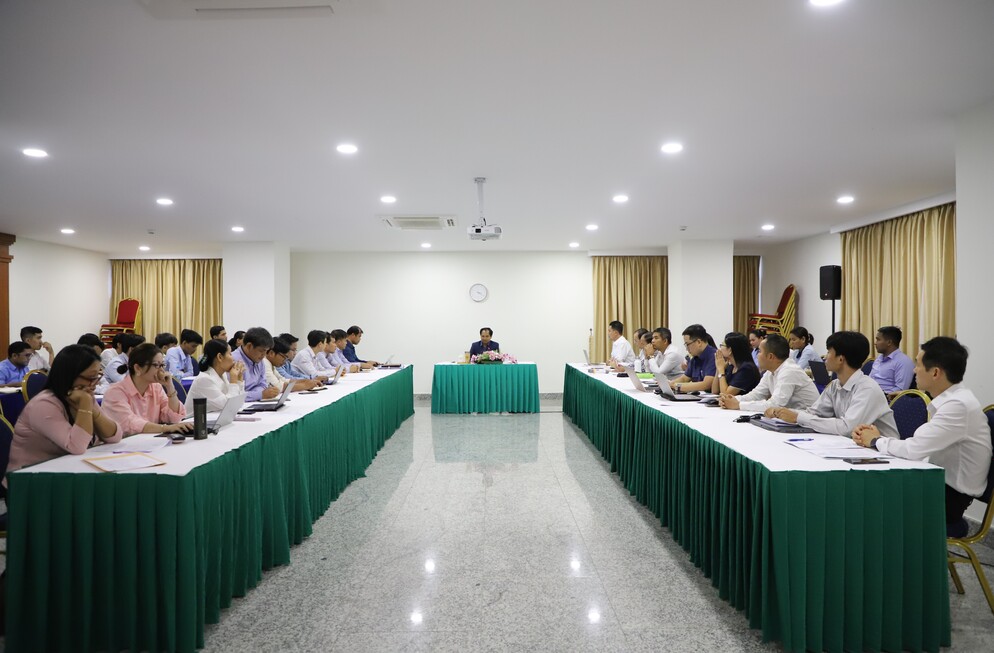
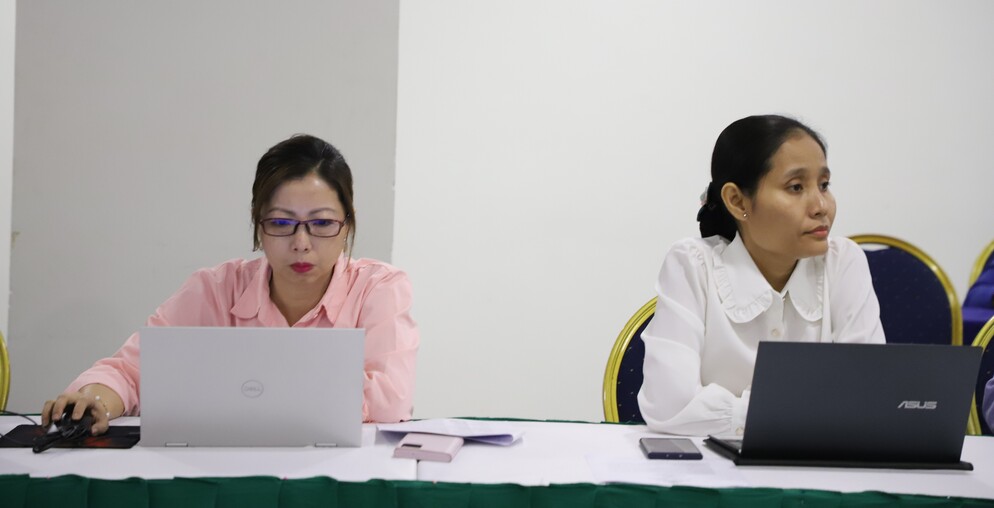
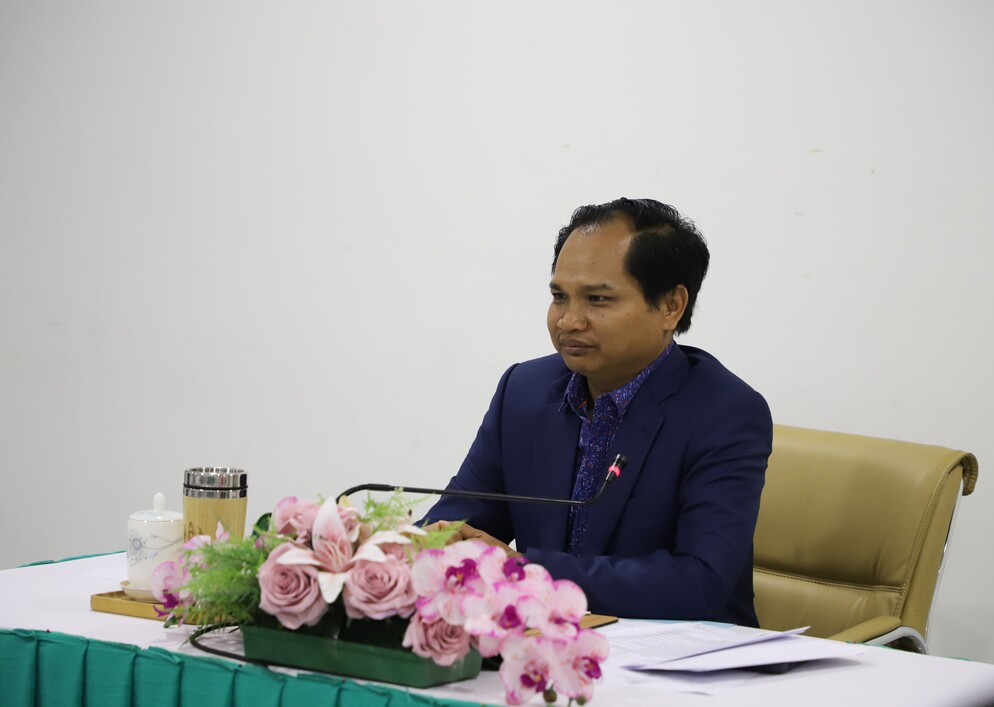
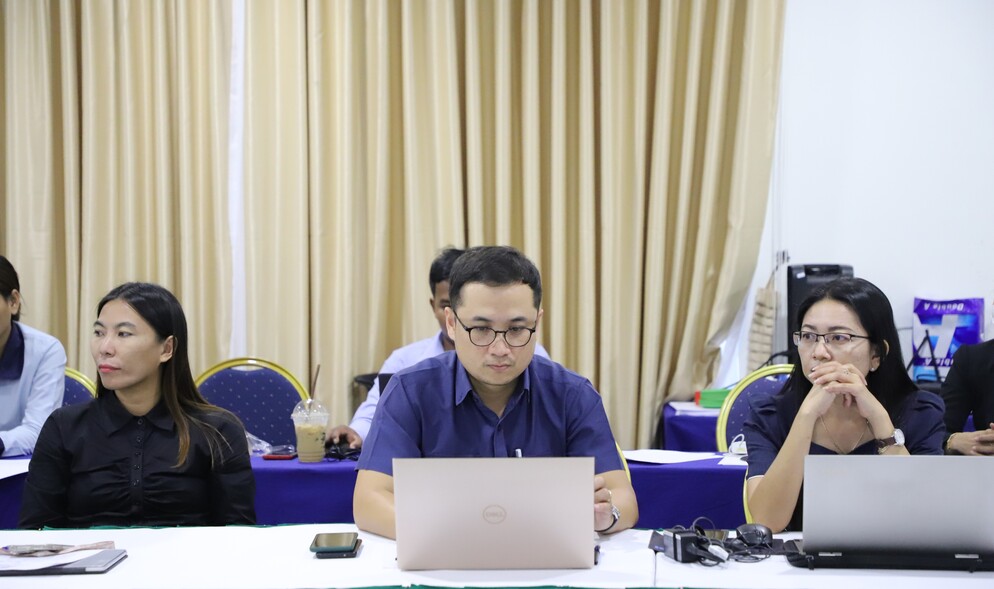
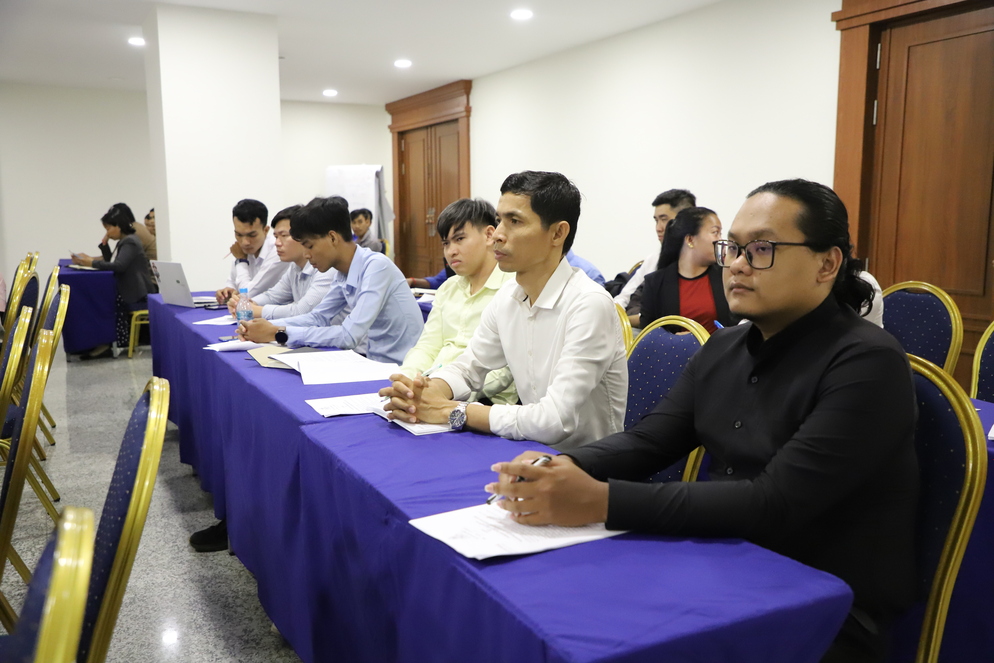
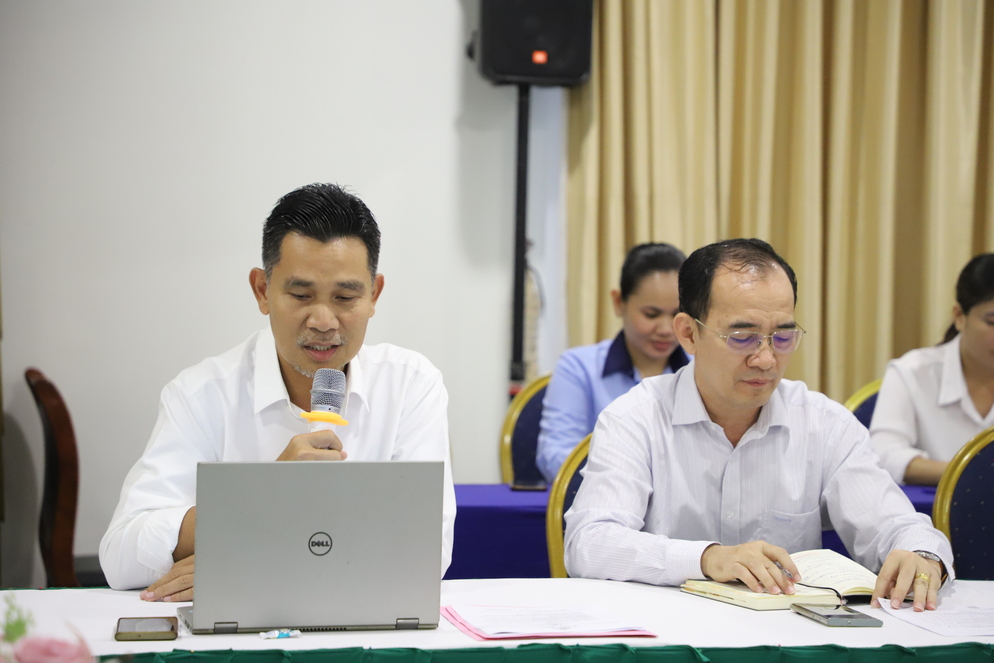
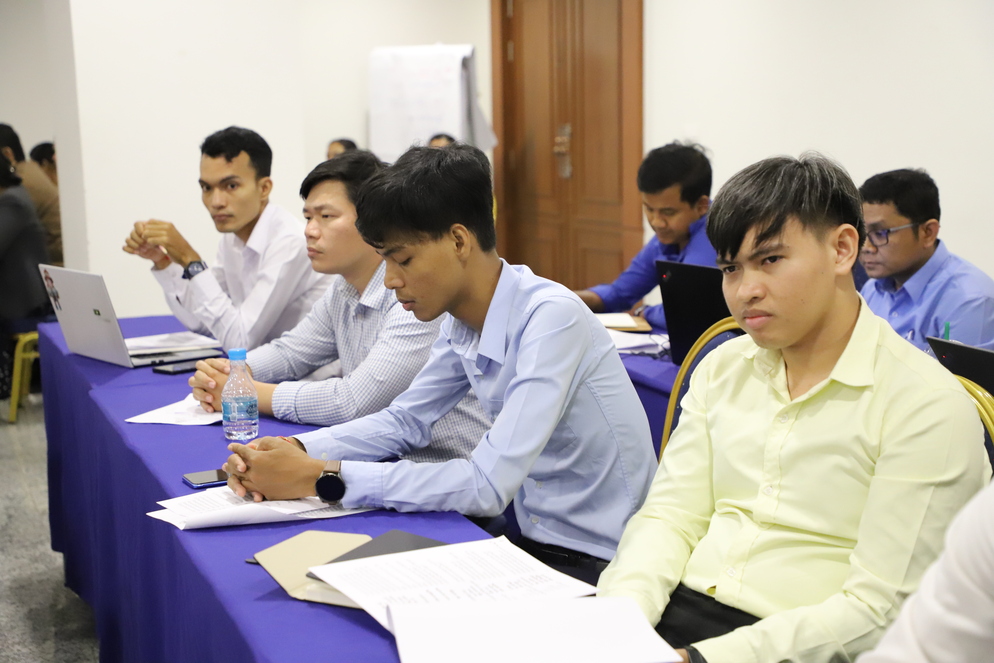
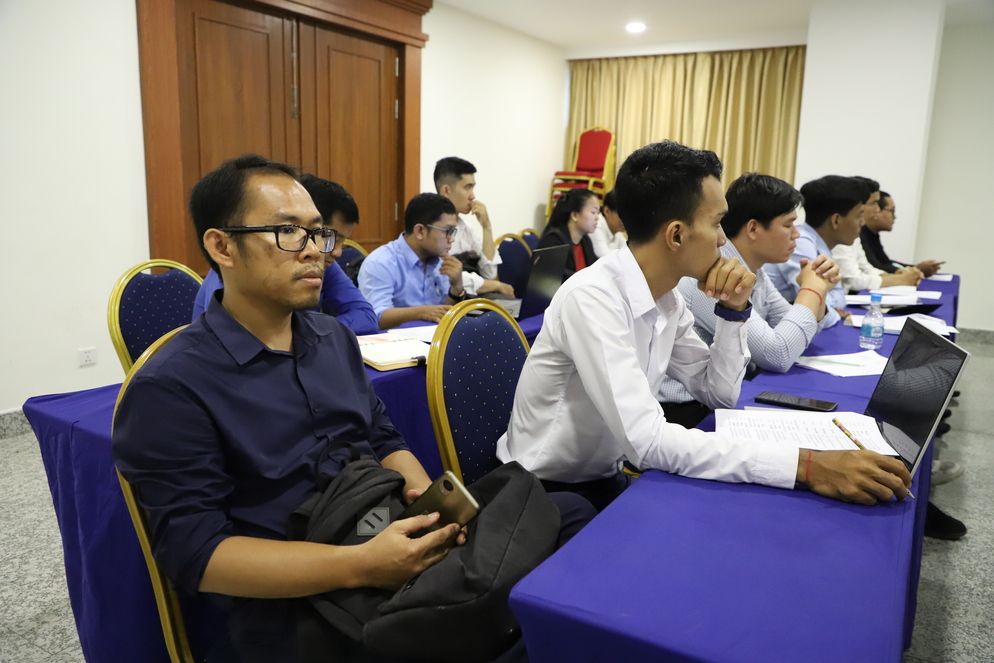
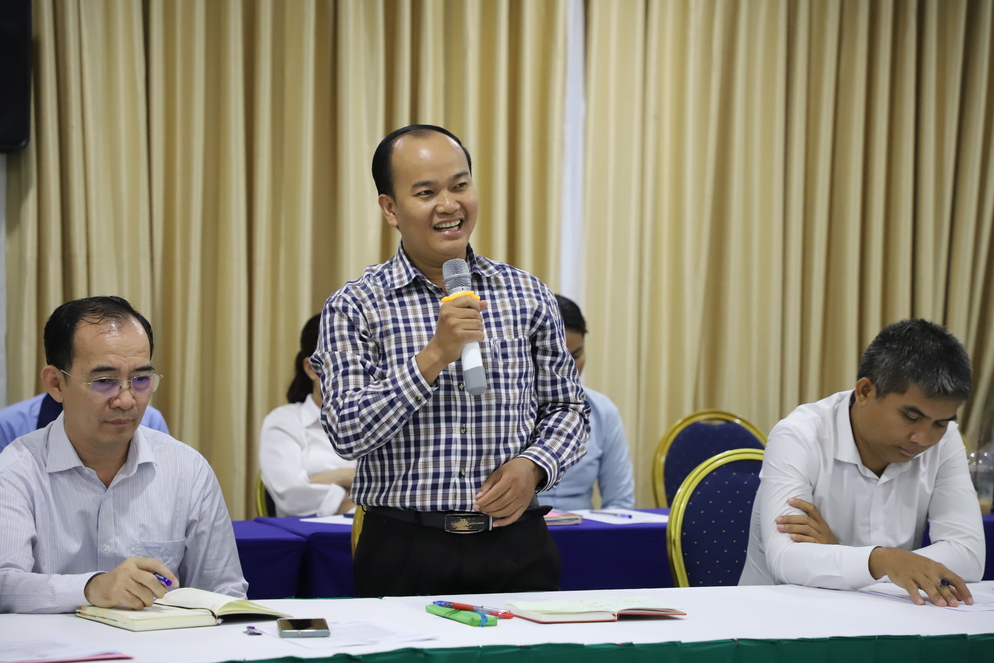
RAC Media | នាយកដ្ឋានទំនាក់ទំនងសាធារណៈនិងពិធីការ
 ថ្ងៃអង្គារ, 26 មីនា 2024 ម៉ោង 06:34 PM
ថ្ងៃអង្គារ, 26 មីនា 2024 ម៉ោង 06:34 PM
នៅក្នុងការបាញ់ប្រហារយ៉ាងរង្គាល នៅក្នុងសាលប្រគុំតន្ត្រីនៃមជ្ឈមណ្ឌល Crocus City Hall ដែលស្ថិតនៅជាយភាគខាងលិចនៃរដ្ឋធានីមូស្គូ និងមានចម្ងាយ២០គីឡូម៉ែត្រពីវិមានក្រឹមឡាំង នៅយប់ថ្ងៃទី២២ ខែមីនា ឆ្នាំ២០២៤ បានបណ្ដាលឱ្យមនុស្សយ៉ាងហោចណាស់ ១៣៣នាក់បានស្លាប់ និងជាង១០០នាក់បានរងរបួស។ ករណីនេះគឺជាការវាយប្រហារភេរវកម្មដ៏អាក្រក់បំផុតមួយនៅក្នុងប្រទេសរុស្ស៊ី បន្ទាប់ពីករណីភេរវកម្មឆ្នាំ២០០៤ ដែលកាលណោះបានបណ្ដាលឱ្យមនុស្សជាង ៣០០នាក់បាត់បង់ជីវិត។ ក្រោយពីកើតហេតុភ្លាម ក្រុមភេរវករ ISIS-K ដែលមានមូលដ្ឋាននៅក្នុងតំបន់ Khorasan នៃប្រទេសអាហ្វហ្កានីស្ថាន បានចេញមុខអះអាង ទទួលខុសត្រូវថា ខ្លួនគឺជាអ្នកនៅពីក្រោយនៃការបាញ់ប្រហារនេះ។

កាលពីខែកញ្ញា ឆ្នាំ២០២២ ក្រុម ISIS-K ក៏ធ្លាប់បានប្រកាសទទួលខុសត្រូវចំពោះការបំផ្ទុះគ្រាប់បែកទៅលើស្ថានទូតរុស្ស៊ី ក្នុងទីក្រុងកាប៊ុល ប្រទេសអាហ្វាហ្កាសនីស្ថានផងដែរ។ ក្រុមនេះតែងតែងបានរិះគន់ចំពោះលោកពូទីន នៅក្នុងសេចក្ដីថ្លែងការណ៍របស់ខ្លួន។ គួរបញ្ជាក់ផងដែរថា ប្រធានាធិបតីរុស្ស៊ី លោក វ្លាឌីមៀរ ពូទីន បានផ្លាស់ប្តូរស្ថានភាពសង្រ្គាមស៊ីវិលនៅក្នុងប្រទេសស៊ីរី តាមរយៈការធ្វើអន្តរាគមន៍នៅឆ្នាំ២០១៥ ដោយគាំទ្រប្រធានាធិបតី Bashar al-Assad ប្រឆាំងនឹងក្រុមប្រឆាំង ដែលក្រោយមកមួយផ្នែកនៃក្រុមនេះ បានងាកទៅចូលរួមបង្កើតក្រុមរដ្ឋអ៊ីស្លាម។
នៅបន្ទាប់ពីកើតឡើងនូវហេតុការណ៍ភេរវកម្មខាងលើនេះ អាជ្ញាធររុស្ស៊ីបានដាក់ការសង្ស័យទៅលើអ៊ុយក្រែនជាអ្នកនៅពីក្រោយនៃការវាយប្រហារនេះ ខណៈជនសង្ស័យដែលបានវាយប្រហារនេះ បានព្យាយាមធ្វើដំណើរទៅកាន់អ៊ុយក្រែន មុននឹងពួកគេត្រូវបានចាប់ខ្លួន។ លោក Dmitry Medvedev អនុប្រធានក្រុមប្រឹក្សាសន្តិសុខ បាននិយាយថា ប្រសិនបើការជាប់ពាក់ព័ន្ធរបស់ទីក្រុង Kyiv ក្នុងការវាយប្រហារលើសាលប្រគុំតន្ត្រីត្រូវបានបញ្ជាក់ នោះអ្នកពាក់ព័ន្ធទាំងអស់ «ត្រូវតែត្រូវបានតាមដាន និងសម្លាប់ដោយគ្មានមេត្តា រួមទាំងរដ្ឋមន្ត្រីនៃរដ្ឋដែលបានប្រព្រឹត្តអំពើហិង្សាបែបនេះ»។

មន្ត្រីអ៊ុយក្រែនបានទទូចថា ពួកគេគ្មានទំនាក់ទំនងនឹងការវាយប្រហារនោះទេ។ អ៊ុយក្រែនប្រាកដជាមិនមានអ្វីទាក់ទងនឹងការបាញ់ប្រហារ/ការផ្ទុះនៅសាលាក្រុ Crocus ។ លោក Mykhailo Podolyak ទីប្រឹក្សារដ្ឋបាលប្រធានាធិបតីអ៊ុយក្រែន បាននិយាយថា វាគ្មានន័យអ្វីទាំងអស់។ លោកបាននិយាយថា «អ៊ុយក្រែនមិនដែលងាកមកប្រើវិធីភេរវកម្មទេ។ វាតែងតែគ្មានន័យ»។
ទោះជាយ៉ាងណា ទាំងមេដឹកនាំ និងមន្ត្រីជាន់ខ្ពស់រុស្ស៊ី បានភ្ជាប់ករណីភេរវកម្មនេះ ទៅនឹងសកម្មភាពប្រឆាំងរុស្ស៊ីពីសំណាក់ប្រទេសអ៊ុយក្រែន ហើយលោកប្រធានាធិបតី ពូទីន ក៏បានប្តេជ្ញាសងសឹកយ៉ាងធ្ងន់ធ្ងរផងដែរ។
ការដាក់ការសង្ស័យទៅលើប្រធានាធិបតីអ៊ុយក្រែនថា គឺជាអ្នកនៅពីក្រោយការវាយប្រហារភេរវកម្មនេះ បានធ្វើឱ្យគេនឹកឃើញដល់ស្ថានភាព ប្រទេសអាហ្វហ្កាសនីស្ថាន ក្រោមការដឹកនាំរបស់របបតាលីបង់ នៅក្នុងឆ្នាំ២០០១ ដែលសហរដ្ឋអាម៉េរិកបានចោទរបបតាលីបង់អាហ្វហ្កាសនីស្ថាន ថាជារដ្ឋគាំទ្រភេរវកម្ម បន្ទាប់ពីព្រឹត្តិការណ៍ភេរវកម្ម ថ្ងៃទី១១ ខែកញ្ញា ឆ្នាំ២០០១ នៅសហរដ្ឋអាម៉េរិក។ ក្នុងន័យនេះ ការវាយប្រហារកាន់តែសន្ធាប់ទៅលើប្រទេសអ៊ុយក្រែន អាចនឹងត្រូវបានរៀបចំឡើងដោយយោធារុស្ស៊ី ដើម្បីបង្ហាញពីជំហរដ៏មុតមាំរបស់មេដឹកនាំរុស្ស៊ី នៅក្នុងការបន្តសង្គ្រាមជាមួយនឹងអ៊ុយក្រែន ក៏ដូចជាការផ្ដល់សារដែលមានន័យជាក់លាក់ទៅកាន់បស្ចិមប្រទេស។
បន្ថែមពីនេះ យុទ្ធនាការប្រយុទ្ធប្រឆាំងនឹងភេរវកម្ម អាចនឹងត្រូវបានលោកពូទីន យកមកធ្វើជាហេតុផលនៅក្នុងការឆ្លើយតបយ៉ាងម៉ឺងម៉ាត់ ប្រឆាំងទៅនឹងជំហរដែលបស្ចិមប្រទេស ពិសេសណាតូ បានបង្ហាញពីការបន្តការគាំទ្ររបស់ខ្លួនទៅដល់ប្រទេសអ៊ុយក្រែនផងដែរ។ ជាមួយគ្នានេះ គេជឿជាក់ថា លទ្ធភាពនៃការចាត់វិធានការជាបន្តបន្ទាប់ រាប់ចាប់តាំងពីការបំពាក់អាវុធកាន់តែទំនើប និងកម្រិតបំផ្លាញកាន់តែខ្ពស់ដល់កងកម្លាំងរុស្ស៊ីនៅក្នុងសមរភូមិជួរមុខ ក៏ដូចជាការចាត់វិធានការកាន់តែរឹតត្បិតដ៏តឹងរ៉ឹង ចំពោះរាល់សកម្មភាពទាំងឡាយណា ដែលអាជ្ញាធររុស្ស៊ីចាត់ទុកថាបង្កហានិភ័យដល់សន្តិសុខជាតិរុស្ស៊ី នឹងត្រូវបានធ្វើឡើងជាក់ជាមិនខាន។
លើសពីនេះទៅទៀត រុស្ស៊ី ក៏អាចនឹងប្រើប្រាស់ហេតុផលប្រយុទ្ធប្រឆាំងនឹងក្រុមភេរវកម្មជ្រុលនិយមនេះ កៀងគរបណ្ដារដ្ឋដែលជាសម្ព័ន្ធមិត្តជាយុទ្ធសាស្ត្ររបស់ខ្លួន ដើម្បីចាត់វិធានការរួមគ្នា ប្រឆាំងនឹងនិន្នាការបញ្ជូនកងទ័ព សព្វាវុធ ឬហិរញ្ញវត្ថុ ទៅដល់អ៊ុយក្រែន ដែលរុស្ស៊ីចាត់ទុកថាជារដ្ឋនៅពីក្រោយការធ្វើភេរវកម្មនៅក្នុងទឹកដីរុស្ស៊ីផងដែរ៕
RAC Media | លឹម សុវណ្ណារិទ្ធ
 ថ្ងៃចន្ទ, 25 មីនា 2024 ម៉ោង 02:46 PM
ថ្ងៃចន្ទ, 25 មីនា 2024 ម៉ោង 02:46 PM
ប្រតិបត្តិនិយម គឺជាប្រពៃណីទស្សនវិជ្ជា ដែលចាត់ទុកភាសា និងការគិតជាឧបករណ៍សម្រាប់ការទស្សន៍ទាយការដោះស្រាយបញ្ហា និងសកម្មភាព ជាជាងការពិពណ៌នា ការបង្ហាញ ឬការឆ្លុះបញ្ចាំងតថភាព។ ប្រតិបត្តិនិយមវិទូ អះអាងថា ប្រធានបទទស្សនវិជ្ជាភាគច្រើន ដូចជាធម្មជាតិនៃចំណេះដឹង ភាសា គោលគំនិត អត្ថន័យ ជំនឿ និងវិទ្យាសាស្ត្រ សុទ្ធតែត្រូវបានមើលយ៉ាងល្អបំផុតទាក់ទងនឹងការប្រើប្រាស់ជាក់ស្តែង និងភាពជោគជ័យរបស់ពួកគេ។ ប្រតិបត្តិនិយម បានចាប់ផ្តើមនៅសហរដ្ឋអាម៉េរិកក្នុងទសវត្សរ៍ឆ្នាំ១៨៧០។
អត្ថិភាពនិយម គឺជាទម្រង់នៃការសិក្សា ស្រាវជ្រាវទស្សនវិជ្ជាដែលស្វែងយល់ពីបញ្ហានៃអត្ថិភាពរបស់មនុស្ស។ ទស្សនវិទូអត្ថិភាពនិយម ស្រាវជ្រាវបញ្ហាទាក់ទងនឹងអត្ថន័យ គោលបំណង និងតម្លៃនៃអត្ថិភាពរបស់ មនុស្ស។ គំនិតទូទៅនៅក្នុងគំនិតអត្ថិភាពនិយម រួមមានវិបត្តិអត្ថិភាព ការភ័យខ្លាច និងការថប់បារម្ភ ចំពោះមុខពិភពលោក ដែលមិនសមហេតុផល និងឆន្ទៈសេរី ក៏ដូចជាភាពត្រឹមត្រូវ ភាពក្លាហាន និងគុណធម៌។
អត្ថិភាពនិយមត្រូវបានផ្សារភ្ជាប់ជា មួយនឹងទស្សនវិទូអឺរ៉ុប នៅសតវត្សរ៍ទី១៩និងសតវត្សរ៍ទី២០ ដែលបានចែករំលែកការសង្កត់ធ្ងន់លើប្រធានបទរបស់មនុស្ស ទោះបីជាជា រឿយៗ មានភាពខុសគ្នាយ៉ាងជ្រាលជ្រៅ នៅក្នុងគំនិតក៏ដោយ។
សូមចូលអានខ្លឹមសារលម្អិត និងមានអត្ថបទស្រាវជ្រាវជាច្រើនទៀតតាមរយ:តំណភ្ជាប់ដូចខាងក្រោម៖
https://rac.gov.kh/researchs-categories/1/researchs?page=10
 ថ្ងៃព្រហស្បតិ៍, 21 មីនា 2024 ម៉ោង 09:18 PM
ថ្ងៃព្រហស្បតិ៍, 21 មីនា 2024 ម៉ោង 09:18 PM
(រាជបណ្ឌិត្យសភាកម្ពុជា)៖ នាព្រឹកថ្ងៃព្រហស្បតិ៍ ១២ កើត ខែផល្គុន ឆ្នាំថោះ បញ្ចស័ក ពុទ្ធសករាជ ២៥៦៧ ត្រូវនឹងថ្ងៃទី២១ ខែមីនា ឆ្នាំ២០២៤នេះ ឯកឧត្ដមបណ្ឌិតសភាចារ្យ សុខ ទូច ប្រធានរាជបណ្ឌិត្យសភាកម្ពុជា បានទទួលជួបពិភាក្សាជាមួយប្រតិភូមន្ទីរអប់រំខេត្តយូណាន ដែលដឹកនាំដោយលោកសាស្ត្រាចារ្យ Zhang Chunhua ប្រធានមន្ទីរអប់រំ ខេត្តយូណាន។
បន្ទាប់ពីបានពិភាក្សាជាមួយប្រតិភូមន្ទីរអប់រំខេត្តយូណានរួច ឯកឧត្ដមបណ្ឌិតសភាចារ្យ ប្រធានរាជបណ្ឌិត្យសភាកម្ពុជា ក៏បានអញ្ជើញចុះអនុស្សរណៈយោគយល់គ្នារវាងរាជបណ្ឌិត្យសភាកម្ពុជា និងសាកលវិទ្យាល័យបណ្ដុះបណ្ដាលវិជ្ជាជីវៈ មេកានិក និងបច្ចេកវិទ្យាអេឡិចត្រូនិក ខេត្តយូណានផងដែរ។
អនុស្សរណៈយោគយល់គ្នារវាងរាជបណ្ឌិត្យសភាកម្ពុជា និងសាកលវិទ្យាល័យបណ្ដុះបណ្ដាលវិជ្ជាជីវៈ មេកានិក និងបច្ចេកវិទ្យាអេឡិចត្រូនិក ខេត្តយូណានខាងលើនេះ ផ្ដោតទៅលើ ៤ចំណុចសំខាន់ៗគឺ៖
១- ដើម្បីលើកកម្ពស់ការអប់រំ និងការបណ្តុះបណ្តាលបច្ចេកទេស
២- ដើម្បីផ្លាស់ប្តូរគ្រូបង្រៀន និងបុគ្គលិក នៃស្ថាប័នទាំងពីរ
៣- ដើម្បីផ្លាស់ប្តូរយោបល់គ្នាទៅវិញទៅមក
៤- អនុវត្តសកម្មភាព និងគម្រោងផ្សេងទៀតដែលភាគីទាំងពីរព្រមព្រៀងគ្នាជាមុន៕








RAC Media | លឹម សុវណ្ណរិទ្ធ
 ថ្ងៃព្រហស្បតិ៍, 21 មីនា 2024 ម៉ោង 04:40 PM
ថ្ងៃព្រហស្បតិ៍, 21 មីនា 2024 ម៉ោង 04:40 PM
ស្របគ្នានឹងបរិយាកាសនៃការប្រើប្រាស់បច្ចេកវិទ្យាកាន់តែខ្លាំងក្នុងជីវភាពរស់នៅក្នុងសង្គម សេដ្ឋកិច្ច និងនយោ បាយនាពេលបច្ចុប្បន្នខួបទិវាអន្តរជាតិនារីលើកទី១១៣ នាឆ្នាំ២០២៤នេះ ប្រារព្ធ ធ្វើឡើងនៅព្រះរាជាណាចក្រកម្ពុជាក្រោមមូលបទ និងក្មេងស្រីក្នុងបរិវត្តកម្មឌីជីថល ។
យោងតាមវចនានុក្រមខ្មែរចេញផ្សាយឆ្នាំ២០២២របស់ក្រុមប្រឹក្សាជាតិភាសាខ្មែរ បរិវត្តន៍ មានន័យថា ដំណើរការផ្លាស់ប្តូរឬបំប្លែងអ្វីមួយឱ្យទៅជាអ្វីមួយផ្សេងទៀត ហើយ ឌីជីថល មានន័យថា សញ្ញាតំណាងដោយលេខ។ ចុះអ្វីទៅជាបរិវត្តកម្មឌីជីថល? Sascha Krause et.al. ក្នុង Sage Journals បានបង្ហាញថា ចាប់តាំងពីប្រហែលជាឆ្នាំ២០០៣មក មានអត្ថបទស្រាវជ្រាវពាក់ព័ន្ធនឹងពាក្យបរិវត្តកម្មឌីជីថលមិនជាច្រើនប៉ុន្មានទេ តែចំនួននេះហក់ឡើងខ្លាំងចាប់តាំងពីឆ្នាំ២០១៤ ម្ល៉ោះហើយការផ្តល់និយមន័យក៏មានច្រើនបែប ច្រើនយ៉ាងទៅតាមទស្សនៈរបស់អ្នកនិពន្ធម្នាក់ៗ។
បរិវត្តកម្មឌីជីថលគឺជានីតិវិធីនៃការប្រើប្រាស់បច្ចេកវិទ្យាដើម្បីផ្លាស់ប្តូរនិងធ្វើឱ្យប្រសើរឡើងយ៉ាងឆាប់រហ័សក្នុងមុខរបរប្រចាំថ្ងៃ។
ការរីករាលដាលនៃជំងឺកូវីដ១៩ចាប់តាំងពីចុងឆ្នាំ២០១៩មកដល់ពេលបច្ចុប្បន្ន បានធ្វើឱ្យបាត់បង់អាយុជីវិតមនុស្សជាច្រើននាក់ ស្ថានភាពសេដ្ឋកិច្ចក៏មានការលំបាកដោយសារគ្រប់ៗគ្នាត្រូវរក្សាគម្លាត។ បរិវត្តកម្មឌីជីថលមានយូរមកហើយ តែការទទួលយកនៅកម្ពុជាមិនសូវច្រើនប៉ុន្មានទេ លុះមានភាពចាំបាច់ដើម្បីការពារអាយុជីវិតកំឡុងពេលមានរោគរាតត្បាត ការប្រើប្រាស់ក៏មានការកើនឡើង ខ្លាំង។ ទោះជាហានិភ័យធ្ងន់ធ្ងរខាងលើសឹងតែកន្លងផុតទៅហើយក្តី ស្រ្តីនិងក្មេងស្រីនៅបន្តប្រើប្រាស់បច្ចេកវិទ្យាឌីជីថលមិនចាញ់បុរសនិងក្មេងប្រុសឡើយ។ តាមរយៈបទពិសោធន៍កន្លងមកក្នុងនាមជាគ្រូបង្រៀនម្នាក់ អ្នកនិពន្ធសូមលើកឡើងពីបទពិសោធន៍មួយចំនួនពាក់ព័ន្ធនឹងបរិវត្តកម្មឌីជីថលរបស់ស្ត្រីនិងក្មេងស្រីក្នុងការសិក្សាស្រាវជ្រាវនិងបង្ហាត់និស្សិត។
សូមចូលអានខ្លឹមសារលម្អិត និងមានអត្ថបទស្រាវជ្រាវជាច្រើនទៀតតាមរយ:តំណភ្ជាប់ដូចខាងក្រោម៖
https://rac.gov.kh/researchs-categories/1/researchs#main-container
 ថ្ងៃព្រហស្បតិ៍, 14 មីនា 2024 ម៉ោង 06:47 PM
ថ្ងៃព្រហស្បតិ៍, 14 មីនា 2024 ម៉ោង 06:47 PM
១៥កើត ខែពិសាខ គឺជាថ្ងៃបុណ្យពិសាខបូជា ប្រចាំឆ្នាំដ៏សំខាន់បំផុតសម្រាប់ពុទ្ធសាសនិកនៅទូទាំងសកលលោក ដើម្បីរំលឹកដល់ថ្ងៃប្រសូត្រ ថ្ងៃត្រាស់ដឹង និងថ្ងៃបរិនិព្វាននៃព្រះពុទ្ធសមណគោតម។ ព្រះអង្គជាបុគ្គលដែលមានគុណូបការៈធំធេងចំពោះមនុស្សជាតិ ដោយបានជួយជីវិតមនុស្សសត្វឱ្យរស់នៅប្រកបដោយសេចក្ដីសុខចាកទុក្ខតាមរយៈព្រះធម៌។ ព្រះអង្គមាននាមដើមសិទ្ធត្ថ ឬ សិទ្ធាថ៌ គឺជាបុត្រានៃមហាក្សត្រត្រកូលសាក្យ នៃប្រទេសឥណ្ឌាបុរាណ។ បិតារបស់ព្រះអង្គខិតខំប្រឹងរិះរកមធ្យោបាយគ្រប់បែបយ៉ាងដើម្បីរៀបចំឱ្យព្រះអង្គស្នងរាជសម្បត្តិ ប៉ុន្តែព្រះ អង្គមិនទទួលយកជីវិតរស់នៅបែបនោះឡើយ។ ព្រះអង្គបានបោះបង់សម្បត្តិលោកិយ ចាកចេញពីរាជវាំង ឃ្លាតចាកប្រពន្ធកូន ស្រីស្នំ និងទ្រព្យទាំងឡាយ ដោយទៅបួសជាសមណ ក្នុងគោលបំណងស្វែងរកការពិតនៃជីវិត។ ព្រះអង្គបាន ប្រព្រឹត្តនូវតបធម៌ ធ្វើនូវទុក្ករកិរិយាតាមប្រពៃណីអ្នកបួសសម័យនោះ អស់រយៈពេល៦ ព្រះវស្សា។ ក្រោយពីបោះបង់ចោលវិធីខុសឆ្គងនេះ ព្រះអង្គបានប្រព្រឹត្តិមជ្ឈិមាបដិប្បទា (វិធីកណ្ដាល) ដោយខ្លួនឯងវិញ។ ទីបំផុត ព្រះអង្គបានរកឃើញទ្រឹស្ដី ចតុរារិយសច្ចៈ ដែលជាការពិតប្រសើរជាងសម្មតិសច្ចៈ។
តើ ព្រះធម៌ដែលព្រះអង្គបានត្រាសដឹង បានបង្ហាញអ្វីខ្លះអំពីទស្សនៈស្ដីពី «ជីវិត និង ការរស់នៅ» ?
សូមចូលអានខ្លឹមសារលម្អិត និងមានអត្ថបទស្រាវជ្រាវជាច្រើនទៀតតាមរយ:តំណភ្ជាប់ដូចខាងក្រោម៖
https://rac.gov.kh/researchs-categories/1/researchs?page=10
 ថ្ងៃព្រហស្បតិ៍, 14 មីនា 2024 ម៉ោង 06:31 PM
ថ្ងៃព្រហស្បតិ៍, 14 មីនា 2024 ម៉ោង 06:31 PM
(រាជបណ្ឌិត្យសភាកម្ពុជា)៖ នៅព្រឹកថ្ងៃព្រហស្បតិ៍ ៥ កើត ខែផល្គុន ឆ្នាំថោះ ពុទ្ធសករាជ ២៥៦៧ ត្រូវនឹងថ្ងៃទី១៤ ខែមីនា ឆ្នាំ២០២៤ លោកសាស្ត្រាចារ្យបណ្ឌិត ម៉ក់ សិទ្ធិរិទ្ធិ អ្នកស្រាវជ្រាវ និងជាប្រធានអង្គការវើលហ្វីស (World's Fish) ប្រចាំប្រទេសកម្ពុជា បានគូសបញ្ជាក់ថា ការបង្កបង្កើនផលស្រូវនៅកម្ពុជាកើនឡើង តែកង្វះកម្លាំងពលកម្ម ហើយប្រជាពលរដ្ឋកំពុងប្រឈមនឹងបញ្ហាបំណុលកើនឡើង។
ថ្លែងបញ្ជាក់នៅក្នុងការធ្វើបទបង្ហាញរបស់ខ្លួនទៅលើប្រធានបទ «អភិបាលកិច្ចទឹកនិងសុវត្ថិភាពទឹកនៅកម្ពុជា» នៅក្នុងសិក្ខាសាលា ស្ដីពី «បច្ចេកវិទ្យាសមស្រប និងនវានុវត្តន៍» ក្រោមប្រធានបទ «អនាគតប្រកបដោយចីរភាព៖ ទឹក ជីវភាពរស់នៅ និងអាកាសធាតុ» លោកសាស្ត្រាចារ្យបណ្ឌិត ម៉ក់ សិទ្ធិរិទ្ធិ បានលើកឡើងថា នៅក្នុងប្រទេសកម្ពុជានាពេលបច្ចុប្បន្ន ការធ្វើបង្កបង្កើនផលនៅកម្ពុជាកើនឡើង តែកង្វះកម្លាំងពលកម្ម ដោយប្រជាពលរដ្ឋបានធ្វើចំណាកស្រុកទៅក្រៅប្រទេស ចំណែកការបង្កបង្កើនផលស្រូវ ដែលមានកំណើននាពេលបច្ចុប្បន្ននេះ ភាគច្រើនធ្វើឡើងដោយជួលគេធ្វើសឹងសព្វគ្រប់។ លើសពីនេះ ប្រជាពលរដ្ឋក៏កំពុងប្រឈមនឹងបញ្ហាបំណុលកើនឡើងផងដែរ ដោយសារតែតម្លៃផលស្រូវដែលទទួលបាន មិនឆ្លើយតបទៅនឹងការចំណាយ ព្រោះកសិករច្រើនតែធ្វើស្រូវដែលមិនត្រូវនឹងទីផ្សារនាំចេញ តាមគម្រោងនាំចេញអង្ករ ១លានតោនរបស់រាជរដ្ឋាភិបាលកម្ពុជា។
បន្ថែមពីនេះ លោកសាស្ត្រាចារ្យបណ្ឌិត ម៉ក់ សិទ្ធិរិទ្ធិ ក៏បានគូសបញ្ជាក់ផងថា ការប្រើប្រាស់ទឹកនៅក្នុងតំបន់បឹងទន្លេសាប ក៏ប្រឈមនឹងបញ្ហាផងដែរ រវាងអ្នកបង្កបង្កើនផលស្រូវ និងអ្នកចិញ្ចឹមត្រី ដោយសារតែអ្នកធ្វើស្រែចង់បង្ហូរទឹកចេញ ប៉ុន្តែអ្នកចិញ្ចឹមត្រីចង់រក្សាទឹកទុក ដើម្បីធានាដល់ដំណើរការអាជីវកម្មរបស់ខ្លួន៕
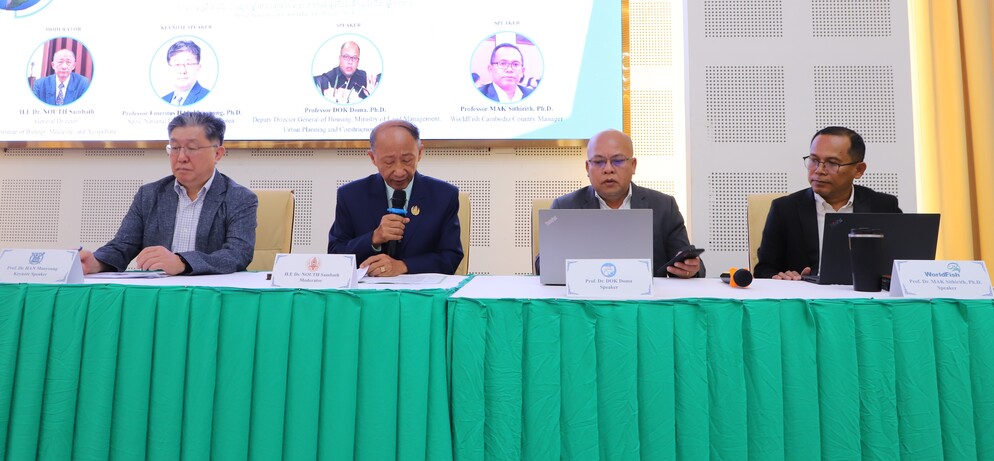
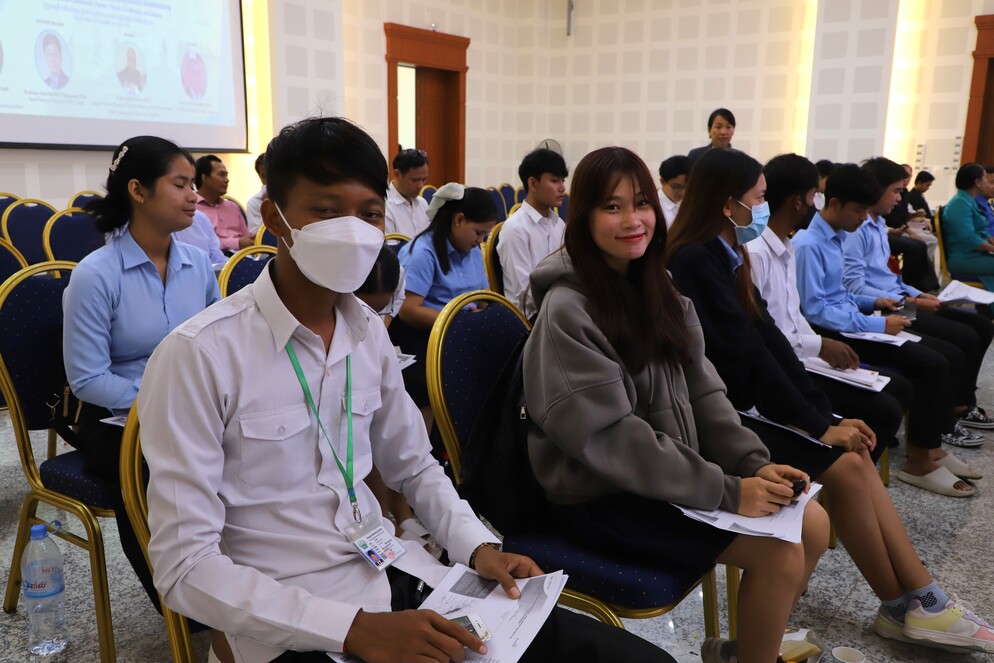
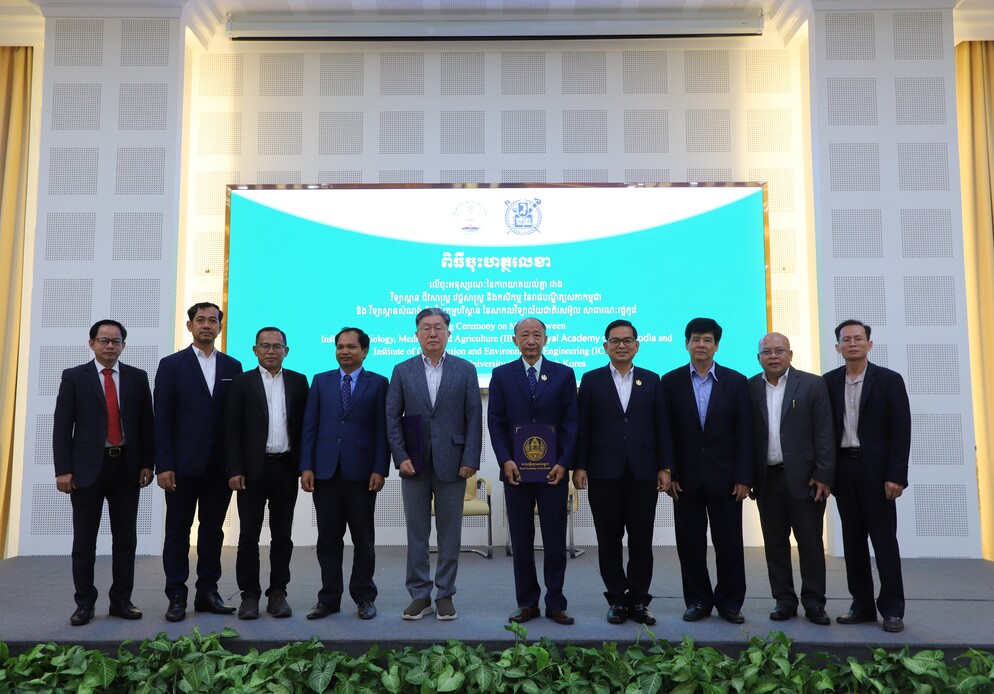
RAC Media | លឹម សុវណ្ណរិទ្ធ
 ថ្ងៃព្រហស្បតិ៍, 14 មីនា 2024 ម៉ោង 06:13 PM
ថ្ងៃព្រហស្បតិ៍, 14 មីនា 2024 ម៉ោង 06:13 PM
(រាជបណ្ឌិត្យសភាកម្ពុជា)៖ នៅព្រឹកថ្ងៃព្រហស្បតិ៍ ៥ កើត ខែផល្គុន ឆ្នាំថោះ ពុទ្ធសករាជ ២៥៦៧ ត្រូវនឹងថ្ងៃទី១៤ ខែមីនា ឆ្នាំ២០២៤ រាជបណ្ឌិត្យសភាកម្ពុជាបានរៀបចំសិក្ខាសាលា ស្ដីពី «បច្ចេកវិទ្យាសមស្រប និងនវានុវត្តន៍» ក្រោមប្រធានបទ «អនាគតប្រកបដោយចីរភាព៖ ទឹក ជីវភាពរស់នៅ និងអាកាសធាតុ» ដែលមានការសម្របសម្រួលពីឯកឧត្ដមបណ្ឌិត នុត សម្បត្តិ ប្រធានវិទ្យាស្ថានជីវសាស្ត្រ វេជ្ជសាស្ត្រ និងកសិកម្ម។
សិក្ខាសាលាដ៏មានសារៈសំខាន់នេះ ត្រូវបានរៀបចំឡើងដោយមានការអញ្ជើញជាវាគ្មិនកិត្តិយសពីសំណាក់៖
១. លោកសាស្ត្រាចារ្យ ដោ ដូម៉ា អគ្គនាយករងនៃអគ្គនាយកដ្ឋានលំនៅឋាន នៃក្រសួងរៀបចំដែនដី នគរូបនីយកម្ម និងសំណង់ ធ្វើបទបង្ហាញអំពីប្រធានបទ «ការវិភាគសុវត្ថិភាពជីវភាពរស់នៅក្នុងអាងទន្លេឆ្លងដែន៖ ក្របខ័ណ្ឌចិញ្ចឹមជីវិតនៅតាមដងទន្លេសាប»
២. លោកសាស្ត្រាចារ្យបណ្ឌិត ម៉ក់ សិទ្ធិរិទ្ធិ អ្នកស្រាវជ្រាវ និងជាប្រធានអង្គការវើលហ្វីស (World's Fish) ប្រចាំប្រទេសកម្ពុជា ធ្វើបទបង្ហាញអំពីប្រធានបទ «អភិបាលកិច្ចទឹកនិងសុវត្ថិភាពទឹកនៅកម្ពុជា»
៣. លោកសាស្ត្រាចារ្យបណ្ឌិត ម៉ូយ៉ុង ហាន ប្រធានវិទ្យាស្ថានសំណង់និងវិស្វកម្ម បរិស្ថាន នៃសាកលវិទ្យាល័យជាតិសេអ៊ូល សាធារណរដ្ឋកូរ៉េ ធ្វើបទបង្ហាញអំពីប្រធានបទ «របៀបធ្វើឱ្យទីក្រុងទំនើប និងធន់នឹងអាកាសធាតុ តាមរយៈការគ្រប់គ្រងទឹកភ្លៀង»
សិក្ខាសាលា ស្ដីពី «បច្ចេកវិទ្យាសមស្រប និងនវានុវត្តន៍» ក្រោមប្រធានបទ «អនាគតប្រកបដោយចីរភាព៖ ទឹក ជីវភាពរស់នៅ និងអាកាសធាតុ» មានការចូលរួមពីសំណាក់មន្ត្រីរាជការ អ្នកសិក្សាស្រាវជ្រាវ និងនិស្សិតសរុបចំនួន ៨៧នាក់។
គួរបញ្ជាក់ផងដែរថា សិក្ខាសាលានាព្រឹកនេះ ក៏ទទួលបានការអញ្ជើញជាកិត្តិយសថ្លែងសុន្ទរកថាបិទដោយឯកឧត្ដមបណ្ឌិត យង់ ពៅ អគ្គលេខាធិការរាជបណ្ឌិត្យសភាកម្ពុជា ព្រមទាំងមានរៀបចំពិធីចុះហត្ថលេខាលើអនុស្សរណៈយោគយល់គ្នារវាង វិទ្យាស្ថានជីវសាស្ត្រ វេជ្ជសាស្ត្រ និងកសិកម្ម នៃរាជបណ្ឌិត្យសភាកម្ពុជា និងសាកលវិទ្យាល័យជាតិសេអ៊ូល នៃសាធារណរដ្ឋកូរ៉េផងដែរ៕
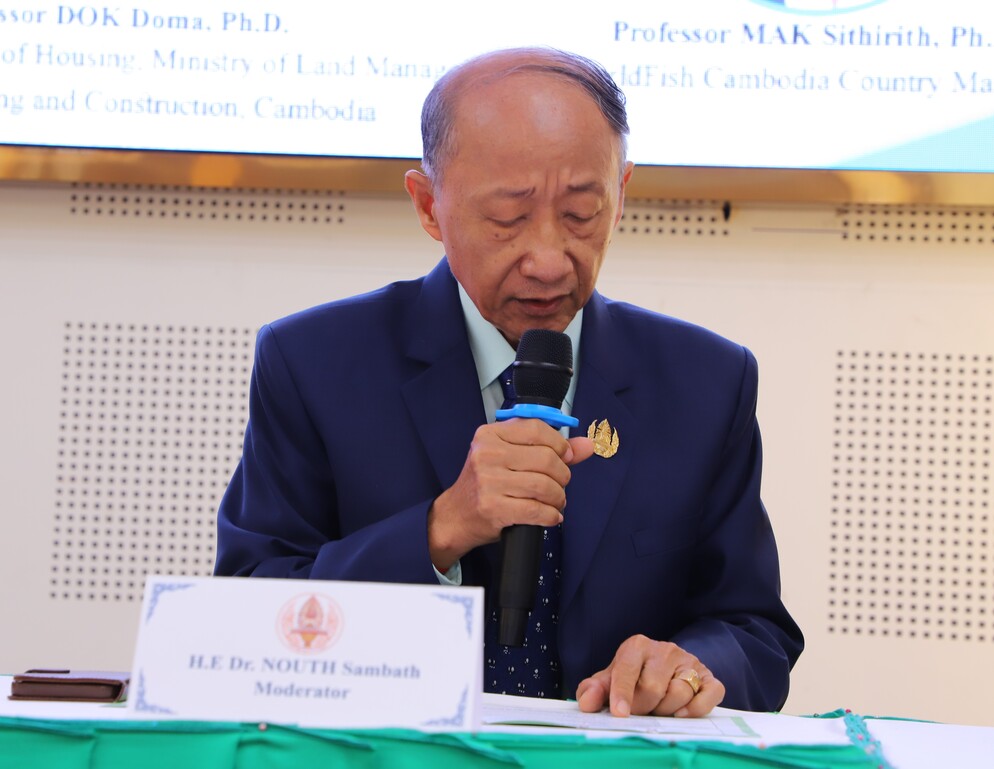
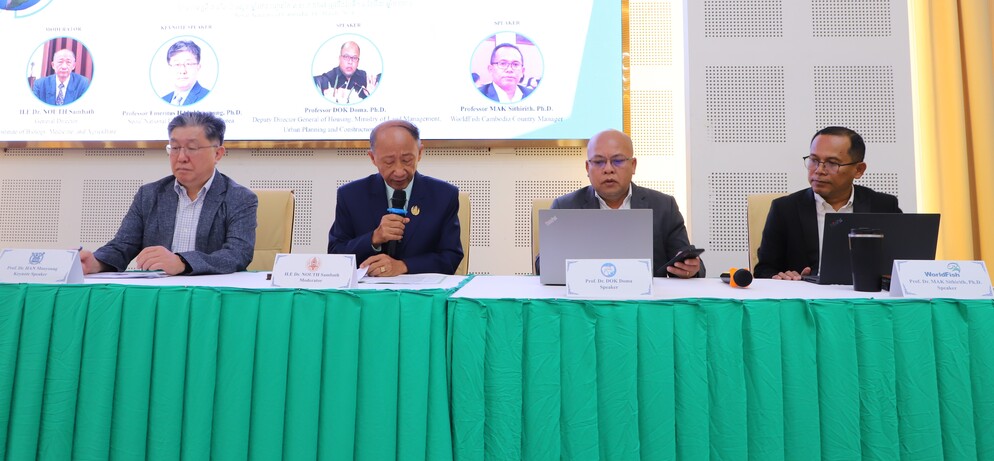
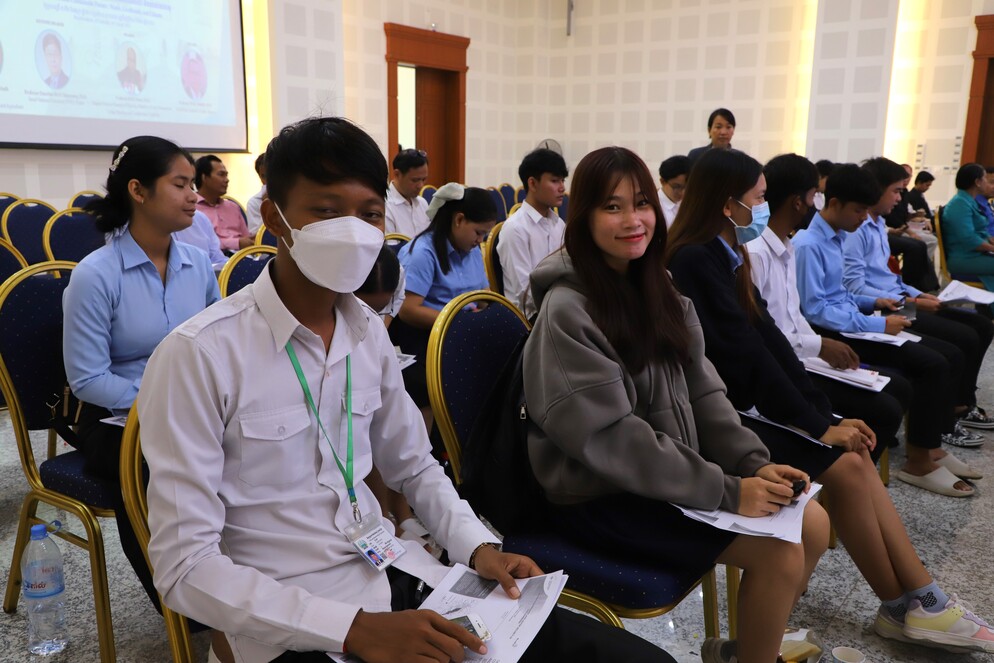
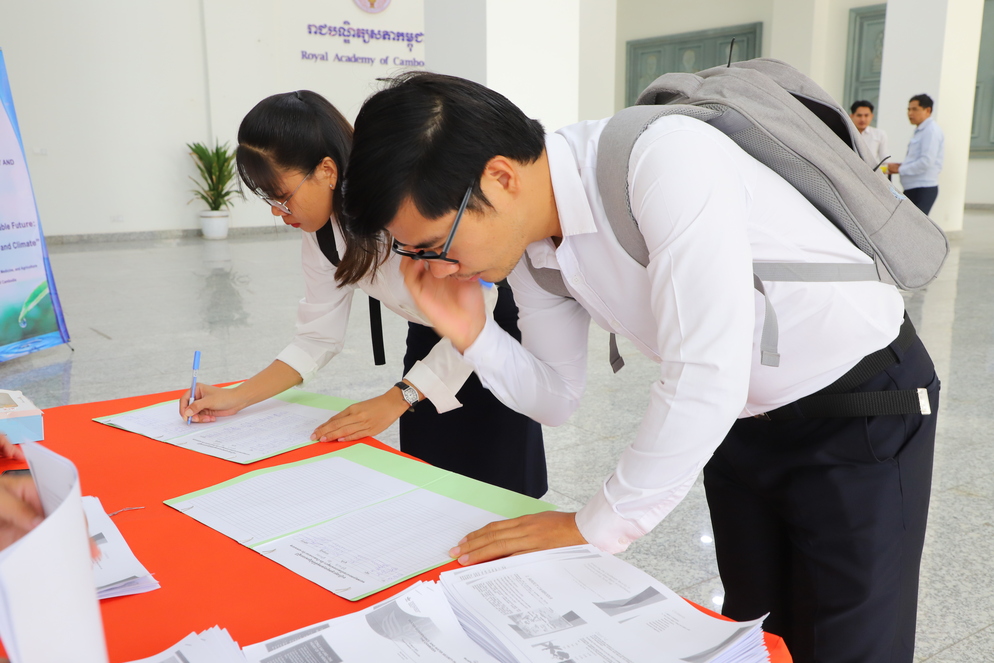
RAC Media | លឹម សុវណ្ណរិទ្ធ
 ថ្ងៃព្រហស្បតិ៍, 14 មីនា 2024 ម៉ោង 06:07 PM
ថ្ងៃព្រហស្បតិ៍, 14 មីនា 2024 ម៉ោង 06:07 PM
(រាជបណ្ឌិត្យសភាកម្ពុជា)៖ ក្នុងឱកាសអញ្ជើញថ្លែងសន្ទរកថាបិទសិក្ខាសាលា ស្ដីពី «បច្ចេកវិទ្យាសមស្រប និងនវានុវត្តន៍» ក្រោមប្រធានបទ «អនាគតប្រកបដោយចីរភាព៖ ទឹក ជីវភាពរស់នៅ និងអាកាសធាតុ» នៅព្រឹកថ្ងៃព្រហស្បតិ៍ ៥ កើត ខែផល្គុន ឆ្នាំថោះ ពុទ្ធសករាជ ២៥៦៧ ត្រូវនឹងថ្ងៃទី១៤ ខែមីនា ឆ្នាំ២០២៤នេះ ឯកឧត្ដមបណ្ឌិត យង់ ពៅ អគ្គលេខាធិការរាជបណ្ឌិត្យសភាកម្ពុជាបានគូសបញ្ជាក់អំពីគុណតម្លៃនៃទឹកថា «ទឹកគឺជាជីវិត ទឹកអាចសង្ក្រោះ ទឹកអាចបម្រើ ហើយទឹកក៏អាចបំផ្លាញផងដែរ»។
ឯកឧត្ដមបណ្ឌិតបានមានប្រសាសន៍លើកឡើងថា បញ្ហាទឹកនៅតែជាបញ្ហាចម្បងមួយ ដែលត្រូវតែគិតគូរពិចារណា និងយកចិត្តទុកដាក់ជាទីបំផុត ព្រោះមានទឹកទើបមានជីវិត ពោលគឺគ្រប់ភាវៈរស់ទាំងអស់នៅលើផែនដីសុទ្ធសឹងតែត្រូវការទឹកជាមូលដ្ឋានសំខាន់នៃជីវិត។ ឯកឧត្ដមបណ្ឌិតបន្តថា បញ្ហាទឹក ជីវភាពរស់នៅ និងអាកាសធាតុបាន និងកំពុងមានផលប៉ះពាល់ខ្លាំងណាស់ដល់សុខភាពពលរដ្ឋក្នុងសង្គមយើងបច្ចុប្បន្ន ហើយក៏ជាកត្តាមួយប៉ះពាល់ដល់ការអភិវឌ្ឍជាតិផងដែរ។
ឯកឧត្ដមបណ្ឌិតក៏បានលើកឡើងអំពីមរតកវប្បធម៌និងអរិយធម៌ខ្មែរពាក់ព័ន្ធនឹងប្រព័ន្ធធារាស្ត្រនេះផងដែរថា ជីវភាពខ្មែរជំនាន់ដើម ពិសេសនៅក្នុងសម័យអង្គរ តែងតែផ្សារភ្ជាប់ទឹកទៅនឹងការរស់នៅប្រចាំថ្ងៃដូចជា ភាសាដែលខ្មែរយើងតែងតែនិយាយថា ទឹកដីស្រីប្រុស ជំនឿកសាងលិង្គព្រះសិវៈនិងយោនីនាងឧមា និងការកសាងវាលលិង្គពាន់នៅក្បាលស្ពានជាដើម។ ឯកឧត្ដមបណ្ឌិតក៏បានគូសបញ្ជាក់បន្ថែមថា ប្រជារាស្ត្រខ្មែរជំនាន់ដើម តែងតែសាងសង់ផ្ទះ ដោយមានជីកស្រះទឹក ឬថ្លុកទឹកនៅក្បែរផ្ទះដើម្បីរក្សាទឹកទុកប្រើប្រាស់ជាការប្រយោជន៍ផ្សេងៗ។ ឯកឧត្ដមបណ្ឌិតក៏បានមានប្រសាសន៍លើកឡើងអំពីសារៈប្រយោជន៍នៃការថែរក្សាប្រភពទឹកនៅក្នុងគម្រោងនគរូបនីយកម្មផងដែរ ដោយរដ្ឋគួរតែត្រៀមទីកន្លែងស្តុកទឹកសម្រាប់ប្រើប្រាស់នៅតាមទីក្រុងនិងទីប្រជុំធំៗ ស្របតាមមរតកវប្បធម៌សំណង់ ដែលមានជាក់ស្ដែងនៅតាមសំណង់ប្រាសាទ និងប្រព័ន្ធធារាស្ត្រ ដែលដូនតាខ្មែរបានបន្សល់ទុក។
ជាមួយគ្នានេះដែរ ឯកឧត្ដមបណ្ឌិត យង់ ពៅ បានគូសបញ្ជាក់បន្ថែមថា កម្ពុជាយើងស្ថិតក្នុងតំបន់ត្រូពិកដែលសំបូរ ទឹកភ្លៀងនៅ រដូវវស្សារហូតបណ្តាលឱ្យមានគ្រោះទឹកជំនាន់ រីឯនៅរដូវប្រាំងវិញ បែរជាក្សត់ទឹកឬគ្រោះរាំង ស្ងួត ពិសេសនៅតំបន់ជនបទដាច់ស្រយាលខ្វះទឹកសម្រាប់ធ្វើសែ្រ ជាក់ស្តែងការប្រើប្រាស់ ទឹកសម្រាប់វិស័យកសិកម្ម ទឹកសម្រាប់បរិភោគ គុណភាពទឹកជាដើម។ ទាំងអស់នេះ គឺជាបញ្ហាចម្បងដែលទាមទារឱ្យមានការយកចិត្តទុកដាក់ខ្ពស់បំផុត ព្រោះថា «ទឹកគឺជីវិត» ទឹកអាចសង្គ្រោះ ទឹកអាចបម្រើ ទឹកអាចបំផ្លាញ។
បន្ថែមពីនេះ ឯកឧត្ដមបណ្ឌិតអគ្គលេខាធិការ ក៏បានលើកឡើងនូវទស្សនាទានចំនួន៣គឺ៖
១- ក្រសួង ស្ថាប័នមានសមត្ថកិច្ចពាក់ព័ន្ធទាំងអស់ គួរមានកិច្ចសហប្រតិ្តបត្តិការ ធ្វើការសិក្សាស្រាវជ្រាវស៊ីជម្រៅ ដើម្បីពិនិត្យវាយតម្លៃបរិមាណទឹកសម្រាប់បម្រើឱ្យវិស័យកសិកម្មក្នុងយុគសម័យឌីជីថលនេះ
២- យើងរួមគ្នាពិចារណាលើឥរិយាបថប្រើប្រាស់ និងគ្រប់គ្រងទឹកភ្លៀង (បរិមាណ គុណភាព គុណប្រយោជន៍...)
៣- បើកទូលាយឱ្យមានអ្នកស្រាវជ្រាវវ័យក្មេង ពិសេសនៅតាមសាកលវិទ្យាល័យឬ ស្ថាប័នស្រាវជ្រាវដែលមានវិជ្ជាជីវៈ ដើម្បីចូលរួមក្នុងកិច្ចការស្រាវជ្រាវតាមបែបវិទ្យាសាស្ត្រ ឱ្យកាន់តែស៊ីជម្រៅ និងទូលំទូលាយ។
ជាចុងក្រោយ ឯកឧត្ដមបណ្ឌិត យង់ ពៅ បានបង្ហាញការគាំទ្រផ្ទាល់របស់ឯកឧត្ដម ចំពោះសកម្មភាពស្រាវជ្រាវវិទ្យាសាស្ត្រនានា ដែលបម្រើប្រយោជន៍ដល់មនុស្សជាតិ ព្រោះ នៅពេលដែលវិទ្យាសាស្រ្តរីកចម្រើន ប្រទេសជាតិក៏រីកចម្រើនផងដែរ ហើយវិទ្យាសាស្ត្របច្ចេកវិទ្យាសមស្រប និងគំនិតច្នៃប្រឌិត ត្រូវតែដើរទន្ទឹមគ្នាជាមួយនឹងវិទ្យាសាស្ត្រសង្គមផងដែរ នៅក្នុងការអភិវឌ្ឍប្រទេសជាតិ ព្រោះការអភិវឌ្ឍប្រទេស មួយមិនអាចខ្វះបាននូវការអភិវឌ្ឍវិទ្យាសាស្ត្រ បច្ចេកវិទ្យាបានទ្បើយ៕
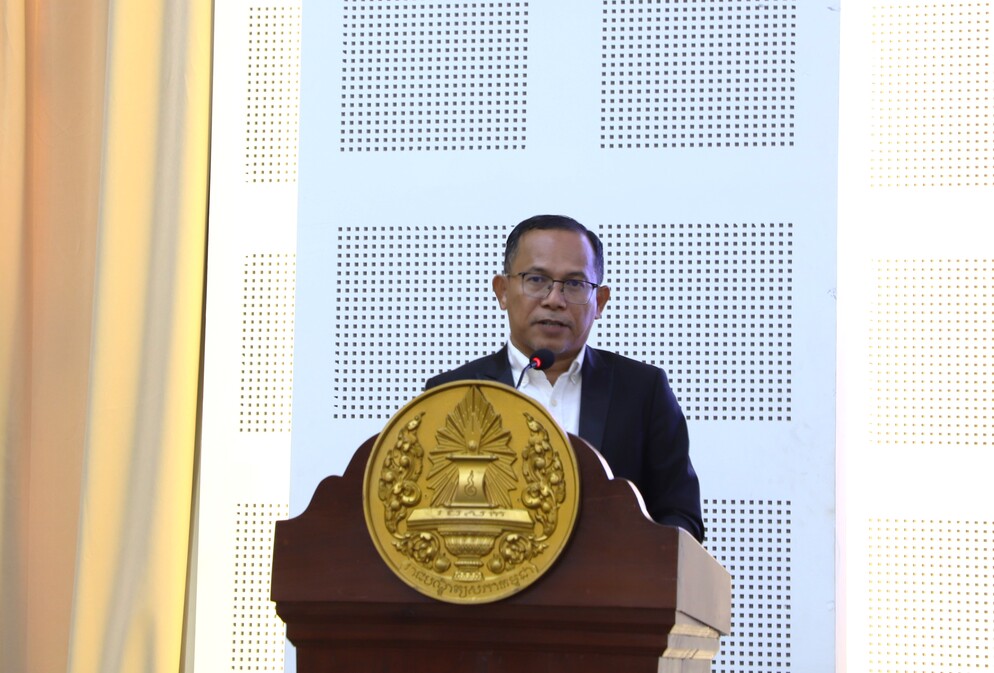
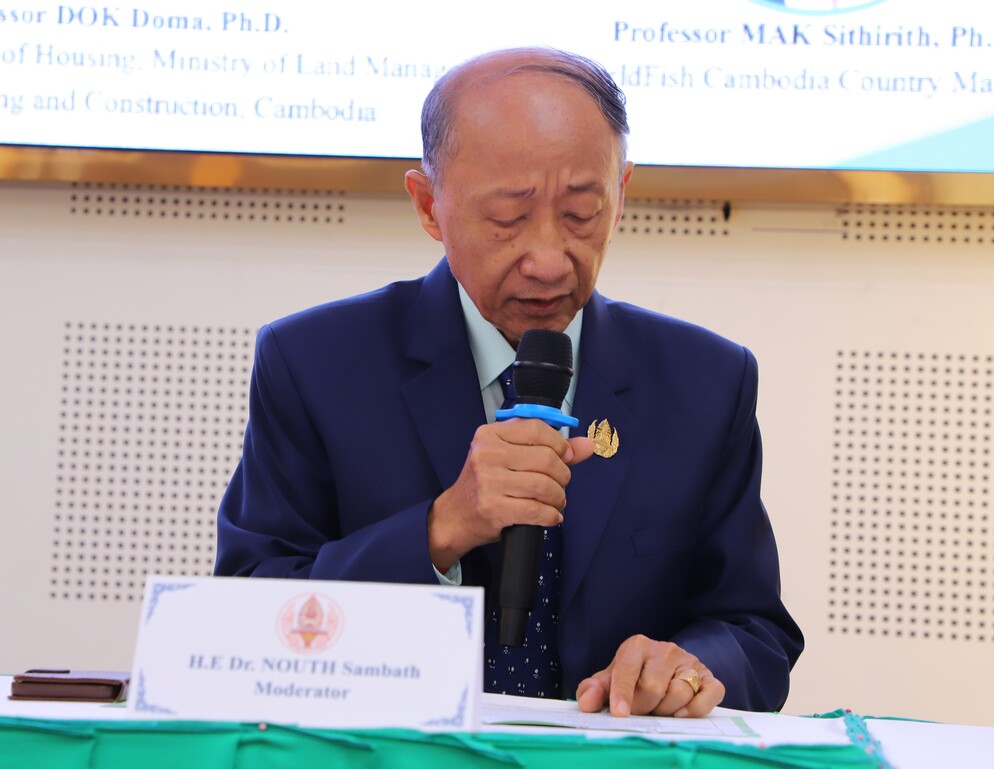
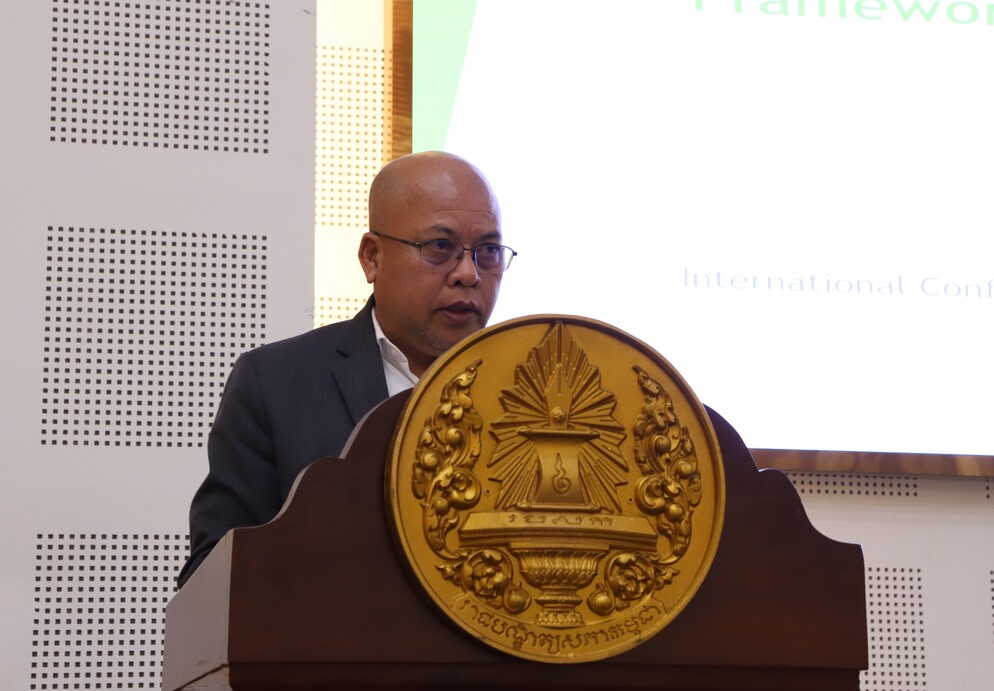
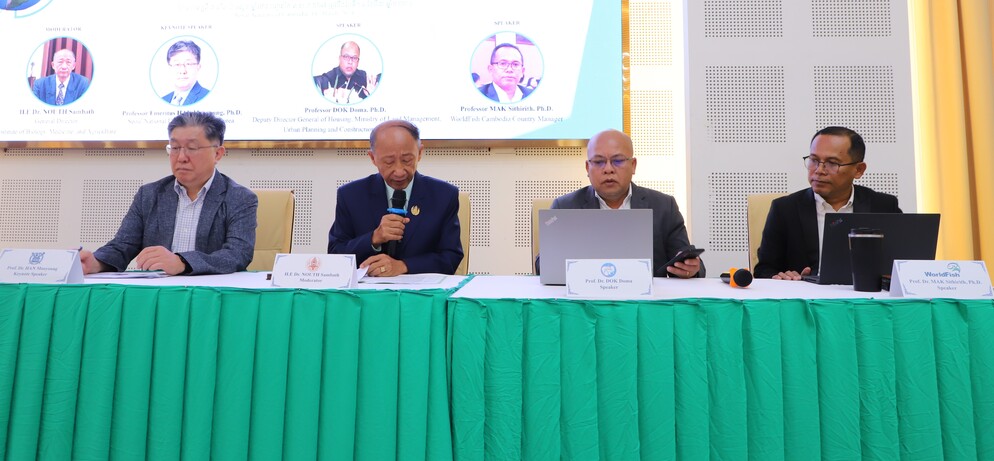
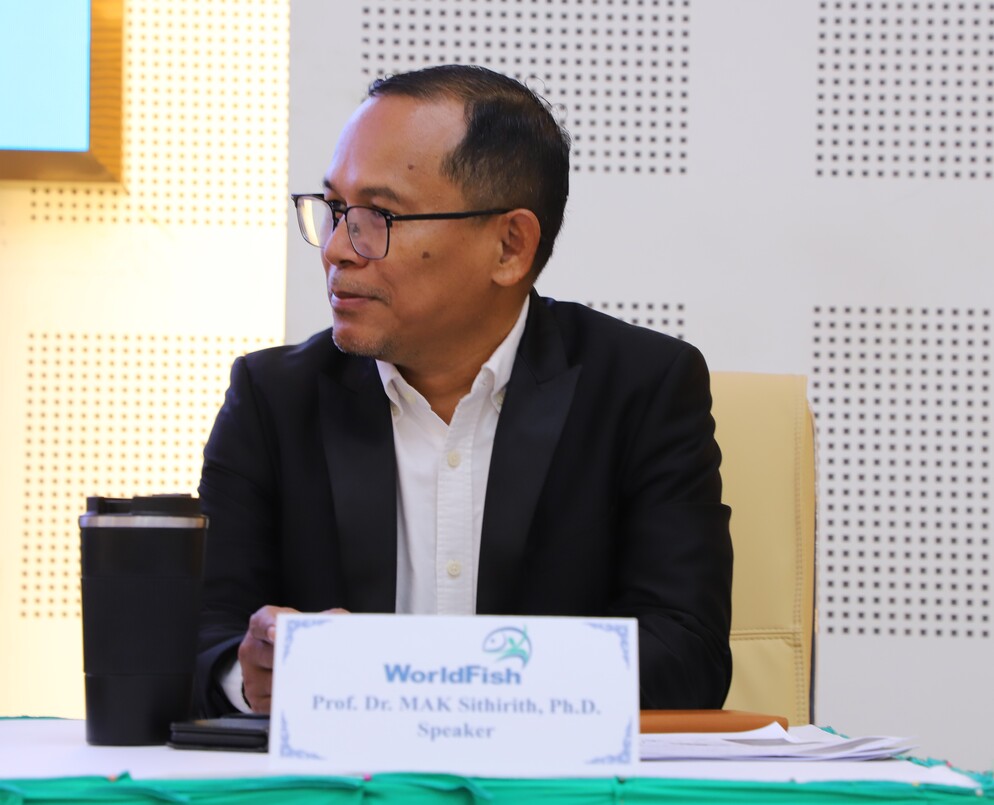
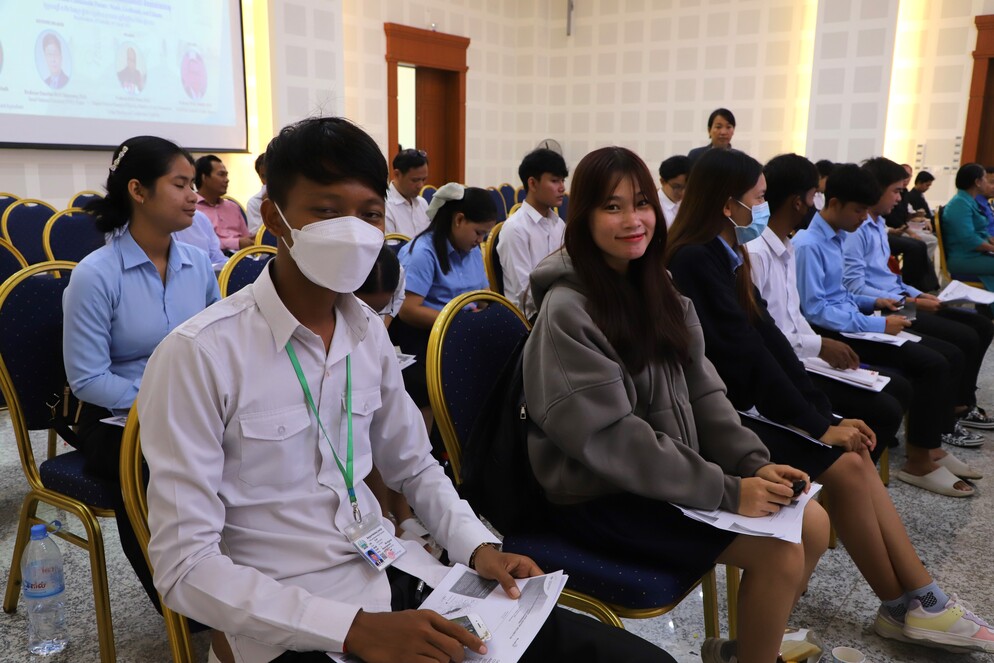
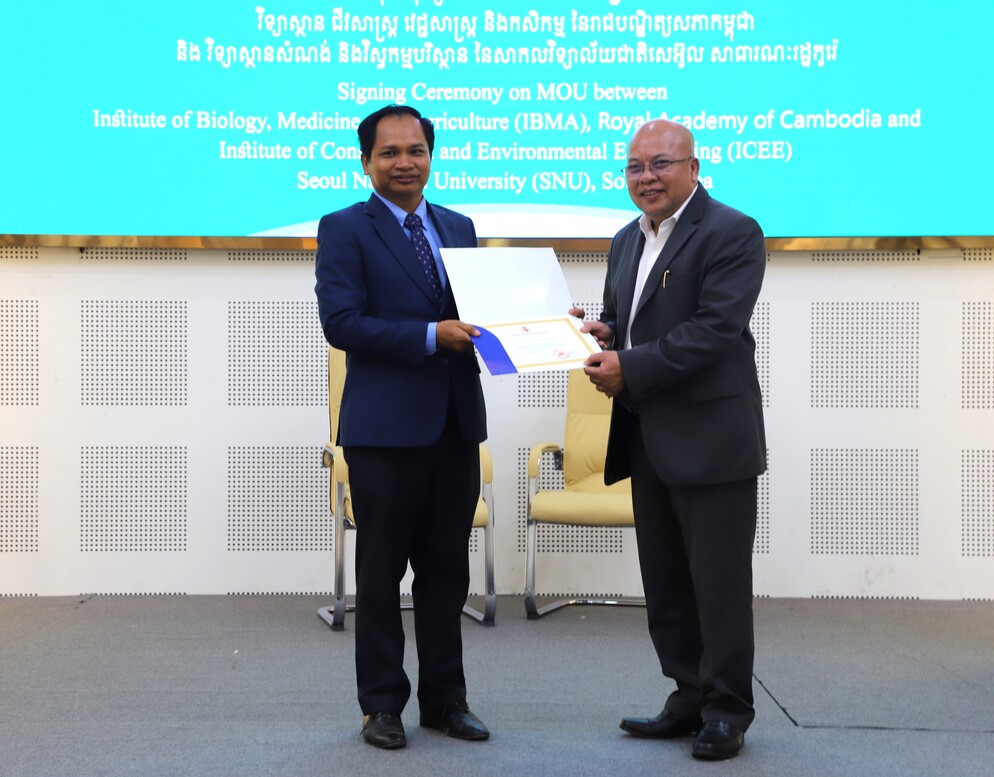
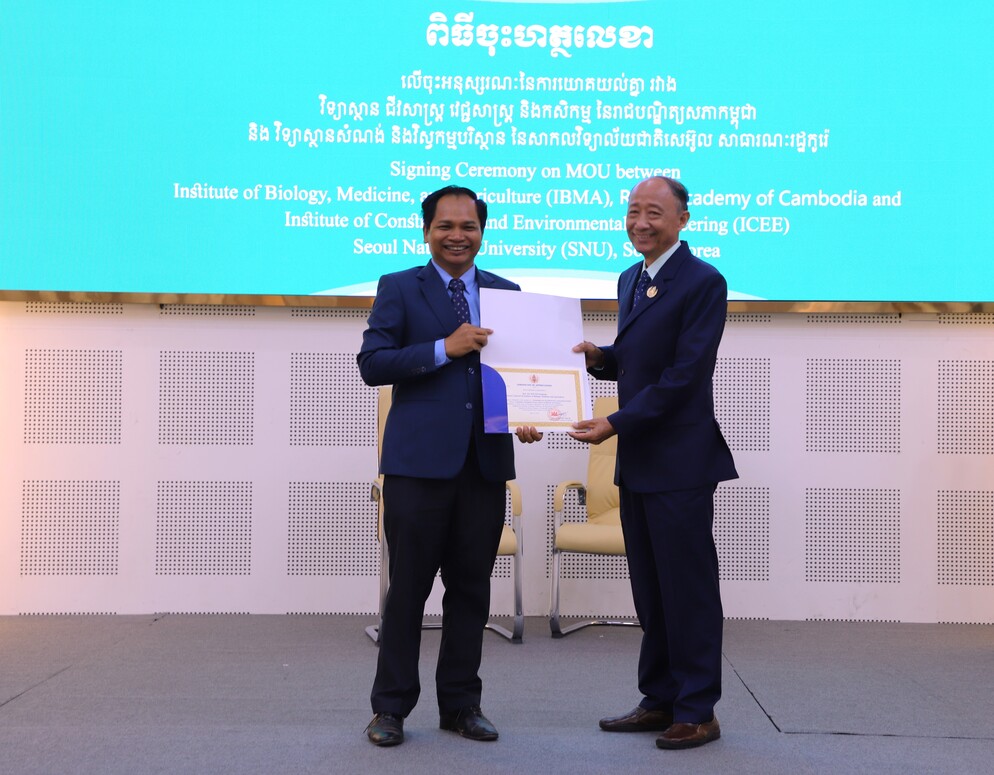
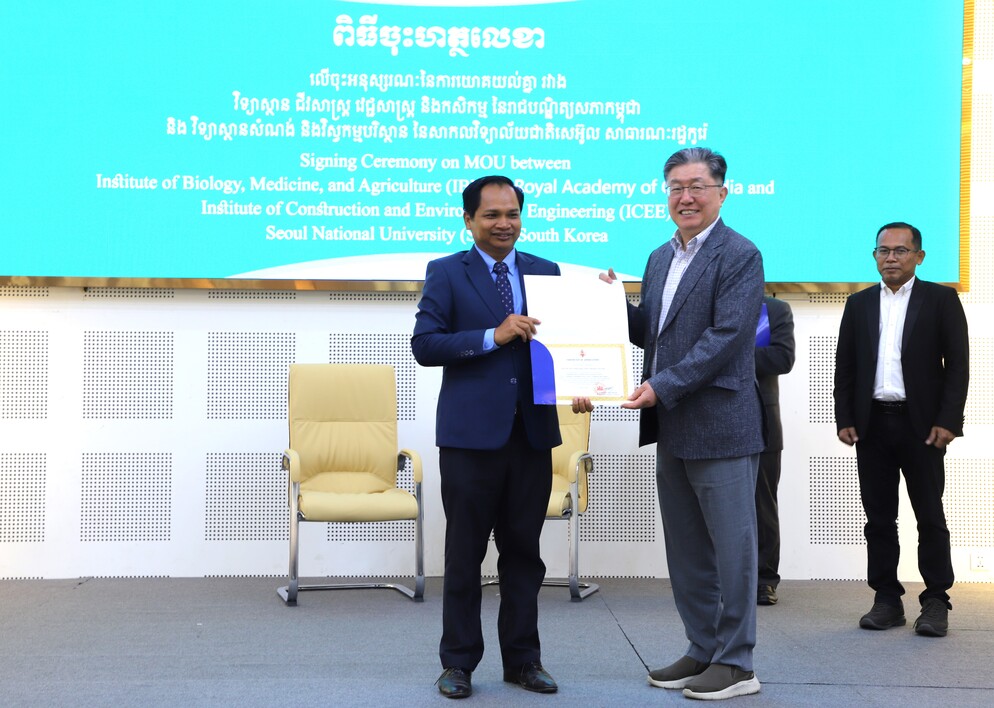
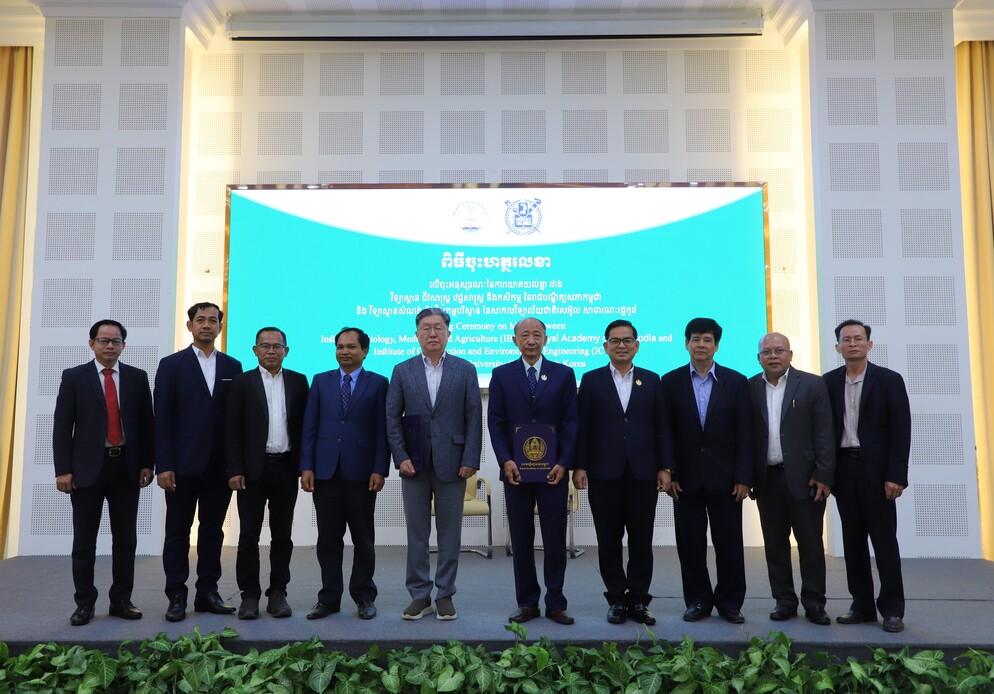
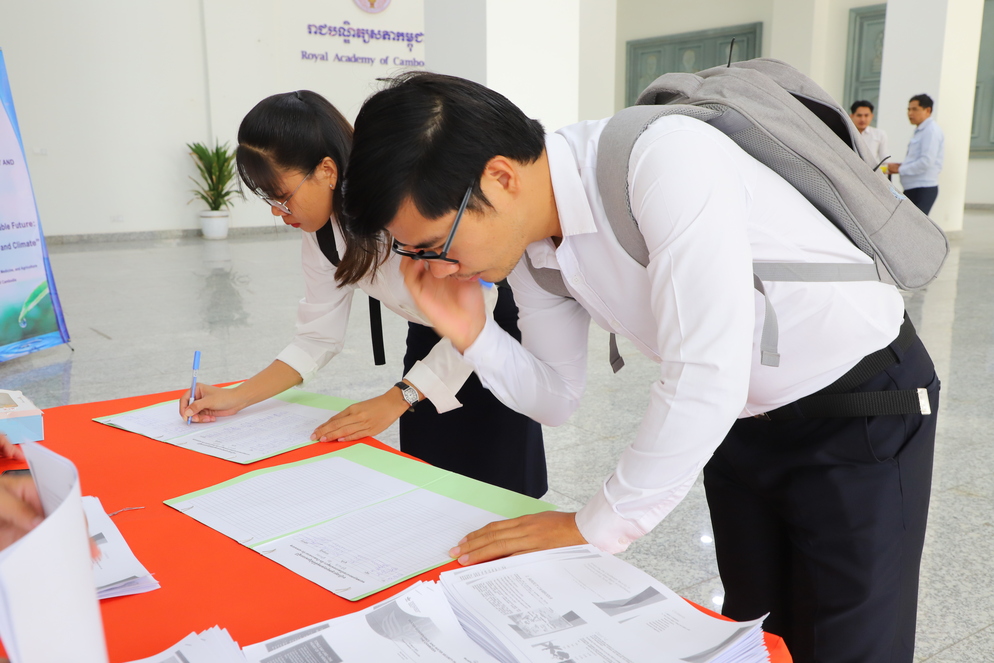
RAC Media | លឹម សុវណ្ណរិទ្ធ
 ថ្ងៃព្រហស្បតិ៍, 14 មីនា 2024 ម៉ោង 06:04 PM
ថ្ងៃព្រហស្បតិ៍, 14 មីនា 2024 ម៉ោង 06:04 PM
(រាជបណ្ឌិត្យសភាកម្ពុជា)៖ ក្នុងឱកាសអញ្ជើញថ្លែងសន្ទរកថាបិទសិក្ខាសាលា ស្ដីពី «បច្ចេកវិទ្យាសមស្រប និងនវានុវត្តន៍» ក្រោមប្រធានបទ «អនាគតប្រកបដោយចីរភាព៖ ទឹក ជីវភាពរស់នៅ និងអាកាសធាតុ» នៅព្រឹកថ្ងៃព្រហស្បតិ៍ ៥ កើត ខែផល្គុន ឆ្នាំថោះ ពុទ្ធសករាជ ២៥៦៧ ត្រូវនឹងថ្ងៃទី១៤ ខែមីនា ឆ្នាំ២០២៤នេះ ឯកឧត្ដមបណ្ឌិត យង់ ពៅ អគ្គលេខាធិការរាជបណ្ឌិត្យសភាកម្ពុជាបានគូសបញ្ជាក់អំពីគុណតម្លៃនៃទឹកថា «ទឹកគឺជាជីវិត ទឹកអាចសង្ក្រោះ ទឹកអាចបម្រើ ហើយទឹកក៏អាចបំផ្លាញផងដែរ»។
ឯកឧត្ដមបណ្ឌិតបានមានប្រសាសន៍លើកឡើងថា បញ្ហាទឹកនៅតែជាបញ្ហាចម្បងមួយ ដែលត្រូវតែគិតគូរពិចារណា និងយកចិត្តទុកដាក់ជាទីបំផុត ព្រោះមានទឹកទើបមានជីវិត ពោលគឺគ្រប់ភាវៈរស់ទាំងអស់នៅលើផែនដីសុទ្ធសឹងតែត្រូវការទឹកជាមូលដ្ឋានសំខាន់នៃជីវិត។ ឯកឧត្ដមបណ្ឌិតបន្តថា បញ្ហាទឹក ជីវភាពរស់នៅ និងអាកាសធាតុបាន និងកំពុងមានផលប៉ះពាល់ខ្លាំងណាស់ដល់សុខភាពពលរដ្ឋក្នុងសង្គមយើងបច្ចុប្បន្ន ហើយក៏ជាកត្តាមួយប៉ះពាល់ដល់ការអភិវឌ្ឍជាតិផងដែរ។
ឯកឧត្ដមបណ្ឌិតក៏បានលើកឡើងអំពីមរតកវប្បធម៌និងអរិយធម៌ខ្មែរពាក់ព័ន្ធនឹងប្រព័ន្ធធារាស្ត្រនេះផងដែរថា ជីវភាពខ្មែរជំនាន់ដើម ពិសេសនៅក្នុងសម័យអង្គរ តែងតែផ្សារភ្ជាប់ទឹកទៅនឹងការរស់នៅប្រចាំថ្ងៃដូចជា ភាសាដែលខ្មែរយើងតែងតែនិយាយថា ទឹកដីស្រីប្រុស ជំនឿកសាងលិង្គព្រះសិវៈនិងយោនីនាងឧមា និងការកសាងវាលលិង្គពាន់នៅក្បាលស្ពានជាដើម។ ឯកឧត្ដមបណ្ឌិតក៏បានគូសបញ្ជាក់បន្ថែមថា ប្រជារាស្ត្រខ្មែរជំនាន់ដើម តែងតែសាងសង់ផ្ទះ ដោយមានជីកស្រះទឹក ឬថ្លុកទឹកនៅក្បែរផ្ទះដើម្បីរក្សាទឹកទុកប្រើប្រាស់ជាការប្រយោជន៍ផ្សេងៗ។ ឯកឧត្ដមបណ្ឌិតក៏បានមានប្រសាសន៍លើកឡើងអំពីសារៈប្រយោជន៍នៃការថែរក្សាប្រភពទឹកនៅក្នុងគម្រោងនគរូបនីយកម្មផងដែរ ដោយរដ្ឋគួរតែត្រៀមទីកន្លែងស្តុកទឹកសម្រាប់ប្រើប្រាស់នៅតាមទីក្រុងនិងទីប្រជុំធំៗ ស្របតាមមរតកវប្បធម៌សំណង់ ដែលមានជាក់ស្ដែងនៅតាមសំណង់ប្រាសាទ និងប្រព័ន្ធធារាស្ត្រ ដែលដូនតាខ្មែរបានបន្សល់ទុក។
ជាមួយគ្នានេះដែរ ឯកឧត្ដមបណ្ឌិត យង់ ពៅ បានគូសបញ្ជាក់បន្ថែមថា កម្ពុជាយើងស្ថិតក្នុងតំបន់ត្រូពិកដែលសំបូរ ទឹកភ្លៀងនៅ រដូវវស្សារហូតបណ្តាលឱ្យមានគ្រោះទឹកជំនាន់ រីឯនៅរដូវប្រាំងវិញ បែរជាក្សត់ទឹកឬគ្រោះរាំង ស្ងួត ពិសេសនៅតំបន់ជនបទដាច់ស្រយាលខ្វះទឹកសម្រាប់ធ្វើសែ្រ ជាក់ស្តែងការប្រើប្រាស់ ទឹកសម្រាប់វិស័យកសិកម្ម ទឹកសម្រាប់បរិភោគ គុណភាពទឹកជាដើម។ ទាំងអស់នេះ គឺជាបញ្ហាចម្បងដែលទាមទារឱ្យមានការយកចិត្តទុកដាក់ខ្ពស់បំផុត ព្រោះថា «ទឹកគឺជីវិត» ទឹកអាចសង្គ្រោះ ទឹកអាចបម្រើ ទឹកអាចបំផ្លាញ។
បន្ថែមពីនេះ ឯកឧត្ដមបណ្ឌិតអគ្គលេខាធិការ ក៏បានលើកឡើងនូវទស្សនទានចំនួន៣គឺ៖
១- ក្រសួង ស្ថាប័នមានសមត្ថកិច្ចពាក់ព័ន្ធទាំងអស់ គួរមានកិច្ចសហប្រតិ្តបត្តិការ ធ្វើការសិក្សាស្រាវជ្រាវស៊ីជម្រៅ ដើម្បីពិនិត្យវាយតម្លៃបរិមាណទឹកសម្រាប់បម្រើឱ្យវិស័យកសិកម្មក្នុងយុគសម័យឌីជីថលនេះ។
២- យើងរួមគ្នាពិចារណាលើឥរិយាបថប្រើប្រាស់និងគ្រប់គ្រងទឹកភ្លៀង (បរិមាណ គុណភាព គុណប្រយោជន៍...)។
៣- បើកទូលាយឱ្យមានអ្នកស្រាវជ្រាវវ័យក្មេង ពិសេសនៅតាមសាកលវិទ្យាល័យឬ ស្ថាប័នស្រាវជ្រាវដែលមានវិជ្ជាជីវៈ ដើម្បីចូលរួមក្នុងកិច្ចការស្រាវជ្រាវតាមបែបវិទ្យាសាស្ត្រ ឱ្យកាន់តែស៊ីជម្រៅ និងទូលំទូលាយ។
ជាចុងក្រោយ ឯកឧត្ដមបណ្ឌិត យង់ ពៅ បានបង្ហាញការគាំទ្រផ្ទាល់របស់ឯកឧត្ដម ចំពោះសកម្មភាពស្រាវជ្រាវវិទ្យាសាស្ត្រនានា ដែលបម្រើប្រយោជន៍ដល់មនុស្សជាតិ ព្រោះ នៅពេលដែលវិទ្យាសាស្រ្តរីកចម្រើន ប្រទេសជាតិក៏រីកចម្រើនផងដែរ ហើយវិទ្យាសាស្ត្របច្ចេកវិទ្យាសមស្រប និងគំនិតច្នៃប្រឌិត ត្រូវតែដើរទន្ទឹមគ្នាជាមួយនឹងវិទ្យាសាស្ត្រសង្គមផងដែរ នៅក្នុងការអភិវឌ្ឍប្រទេសជាតិ ព្រោះការអភិវឌ្ឍប្រទេស មួយមិនអាចខ្វះបាននូវការអភិវឌ្ឍវិទ្យាសាស្ត្រ បច្ចេកវិទ្យាបានទ្បើយ៕
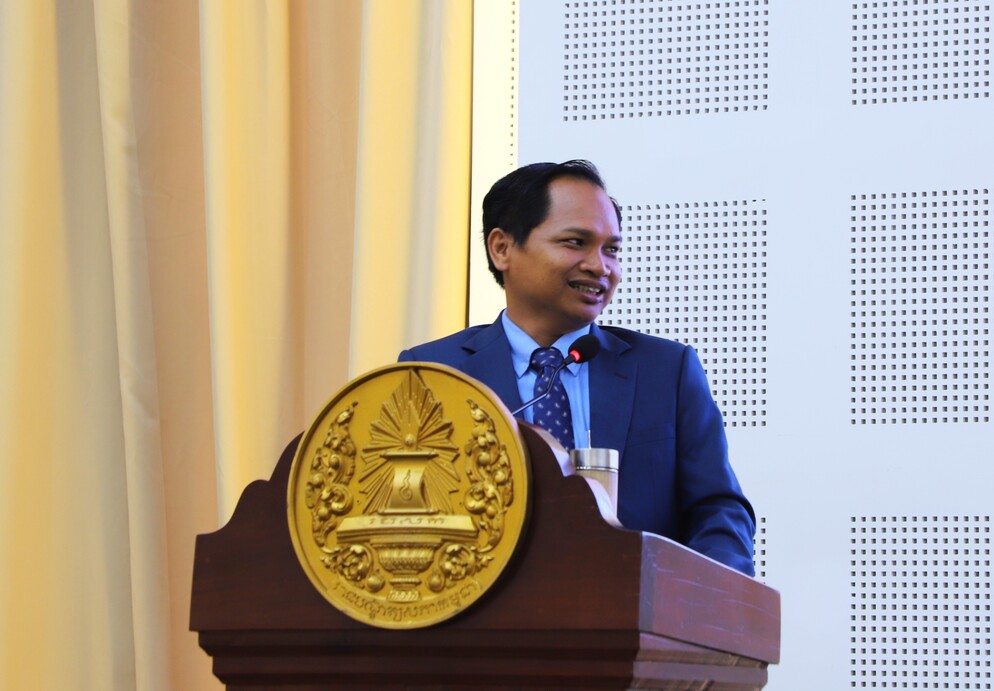
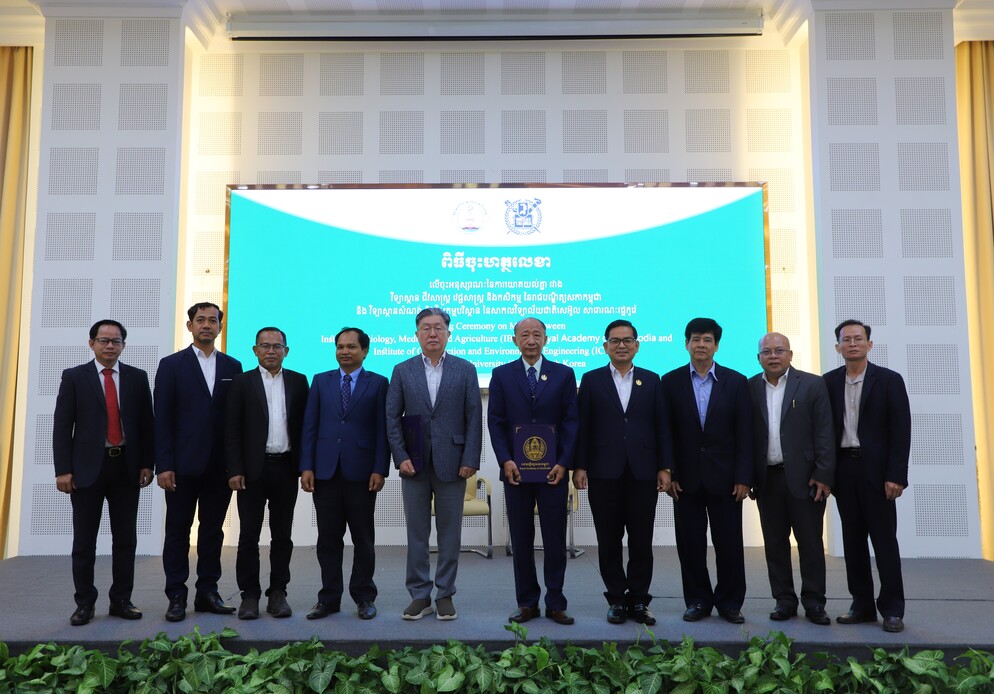
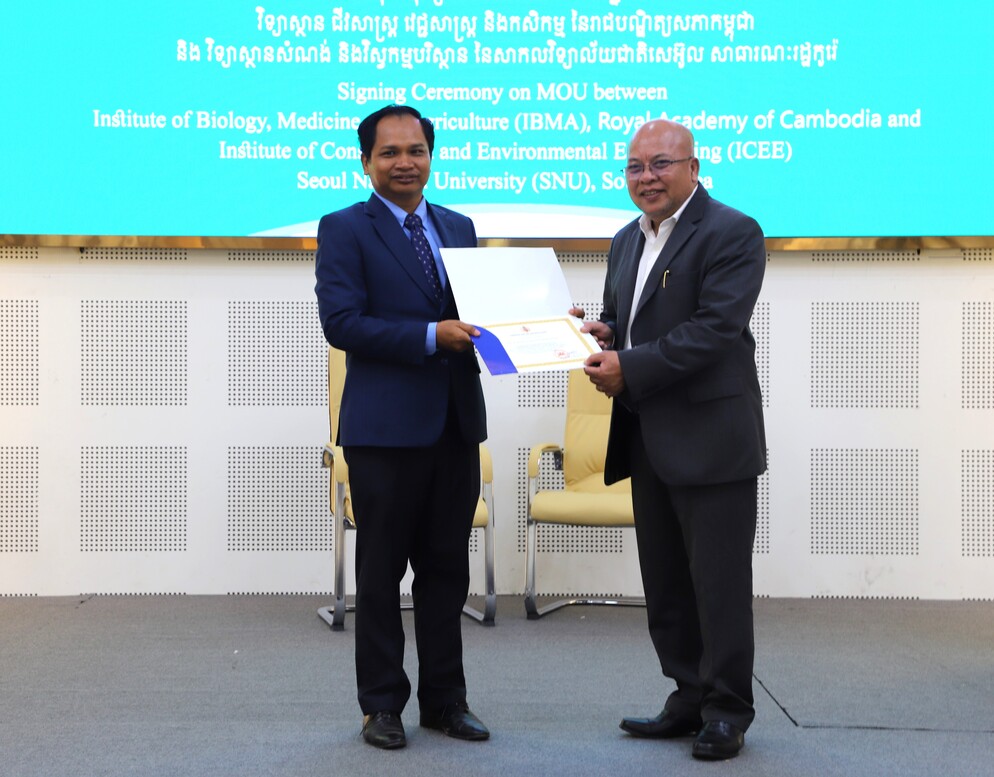
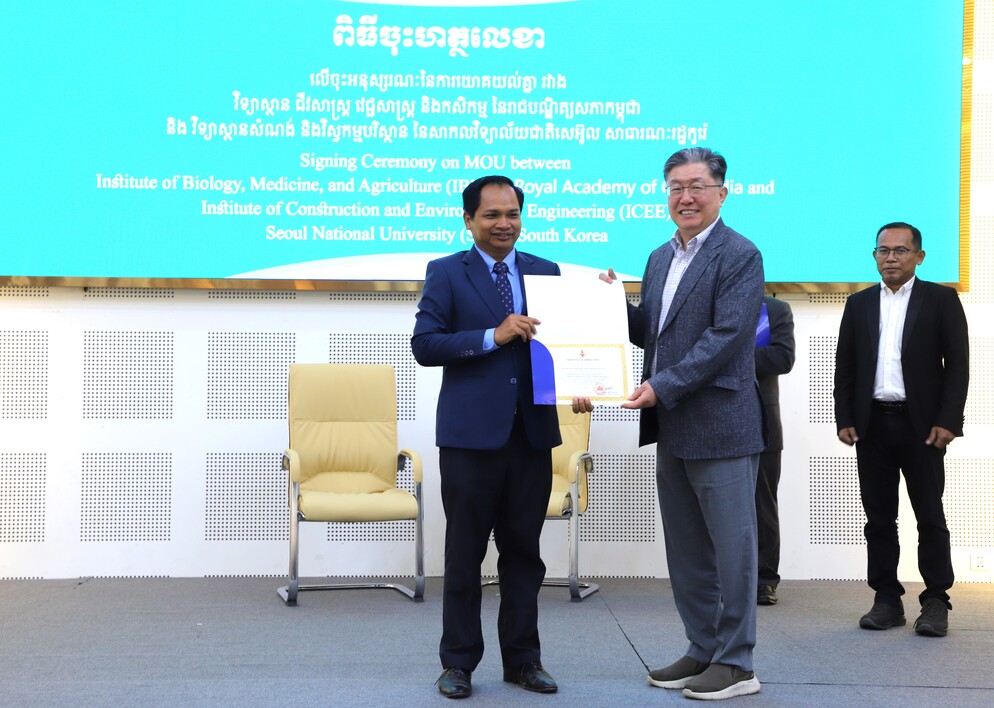
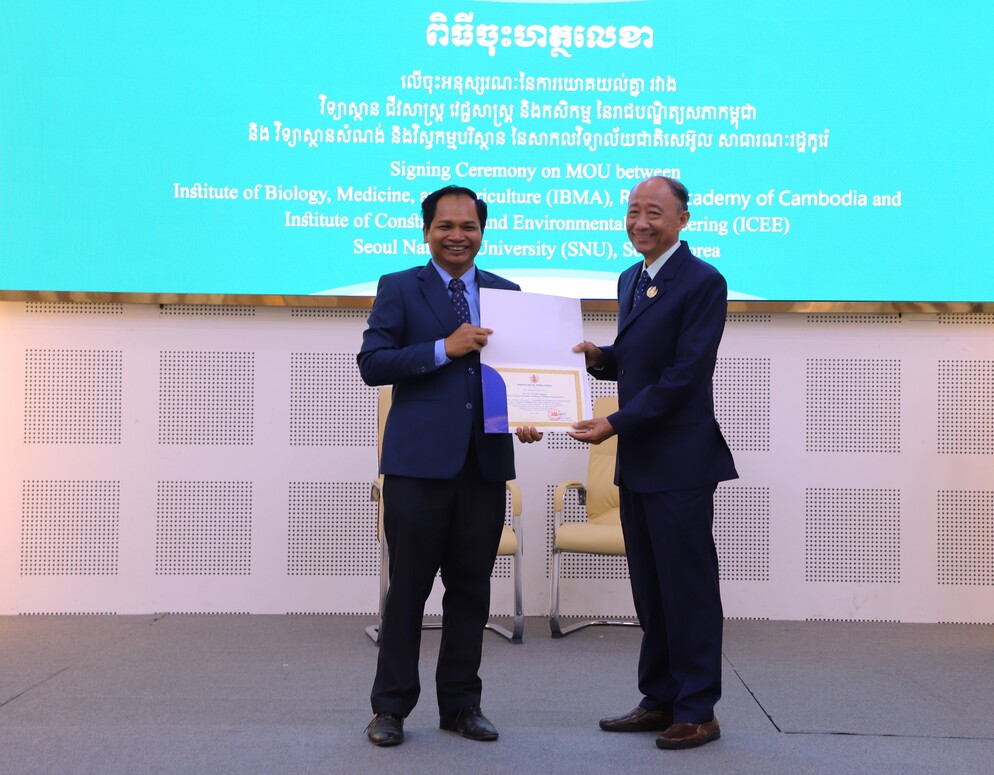
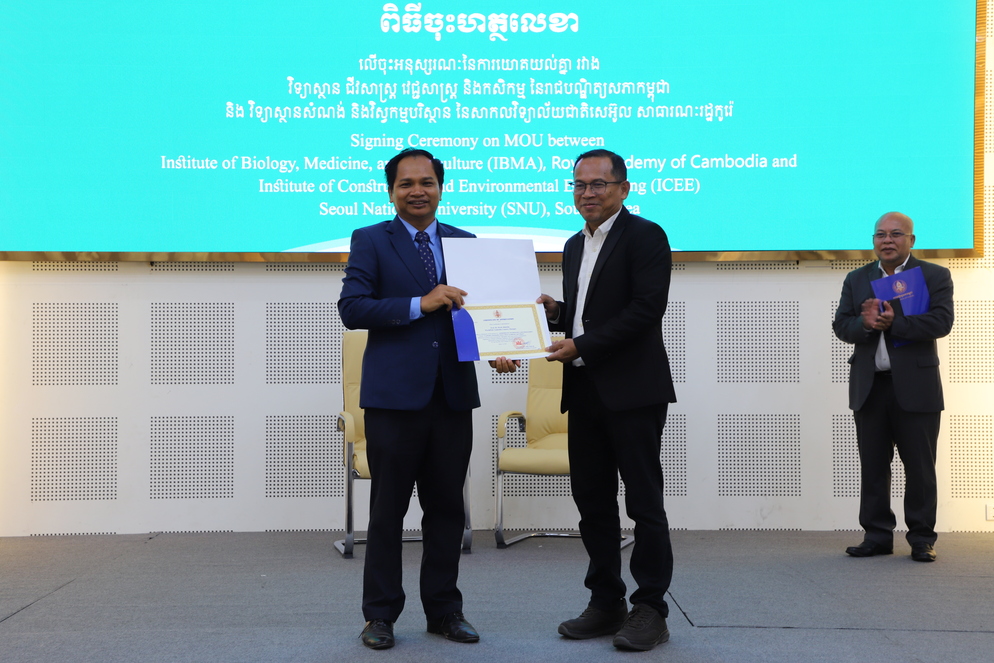
RAC Media | លឹម សុវណ្ណរិទ្ធ
 ថ្ងៃព្រហស្បតិ៍, 14 មីនា 2024 ម៉ោង 05:32 PM
ថ្ងៃព្រហស្បតិ៍, 14 មីនា 2024 ម៉ោង 05:32 PM
សេចក្ដីជូនដំណឹង ស្តីពី"ការអញ្ជើញចូលរួមដេញថ្លៃ ការផ្គត់ផ្គង់ប្រេងឥន្ធនៈប្រចាំឆ្នាំ២០២៤ សម្រាប់ជរាជបណ្ឌិត្យសភាកម្ពុជា ចាប់ពីថ្ងៃទី១៨ មេសា ឆ្នាំ២០២៤។ *ចាប់ទទួលលក់ពាក្យដេញថ្លៃពីថ្ងៃនេះតទៅ រហូតដល់ថ្ងៃទី១៨ ខែមេសា ឆ្នាំ២០២៤ វេលាម៉ោង ១០.៣០នាទីព្រឹក។ ទូរសព្ទទំនាក់ទំនង : ០២៣ ៨៩០ ១៨០។
ថ្ងៃចន្ទ, 08 មេសា 2024 ម៉ោង 02:35 PM
សេចក្ដីជូនដំណឹង ស្តីពីការ ចូលរួមដេញថ្លៃ ផ្គត់ផ្គង់សម្ភារៈអេឡិចត្រូនិកសម្រាប់រាជបណ្ឌិត្យសភាកម្ពុជា ចាប់ពីថ្ងៃទី៥ មិថុនា ឆ្នាំ២០២៣។ *កាលបរិច្ឆេទឈប់ទទួលពាក្យដេញថ្លៃ៖ ថ្ងៃទី៣០ ខែមិថុនា ឆ្នាំ២០២៣ វេលាម៉ោង ១០.៣០នាទីព្រឹក។ ទូរសព្ទទំនាក់ទំនង : 012 78 36 46។
ថ្ងៃសុក្រ, 02 មិថុនា 2023 ម៉ោង 09:21 PM
វគ្គសិក្សាថ្មី សម្រាប់ឆ្នាំសិក្សាថ្មី ឆ្នាំ២០២២-២០២៣ ! សម្រាប់ថ្នាក់បរិញ្ញាបត្រជាន់ខ្ពស់ និងថ្នាក់បណ្ឌិត នៅរាជបណ្ឌិត្យសភាកម្ពុជា ចាប់ផ្តើមទទួលចុះឈ្មោះហើយ.... ព័ត៌មានលម្អិត សូមទាក់ទងមជ្ឈមណ្ឌលបណ្តុះបណ្តាលនិងស្រាវជ្រាវនៃរាជបណ្ឌិត្យសភាកម្ពុជា (អគារឥន្រ្ទទេវី) ឬតាមរយៈទូរសព្ទ៖ 067-811-667 / 010-268-797 / 099-238-677 / 097 728 4444
ថ្ងៃចន្ទ, 22 សីហា 2022 ម៉ោង 03:11 PM